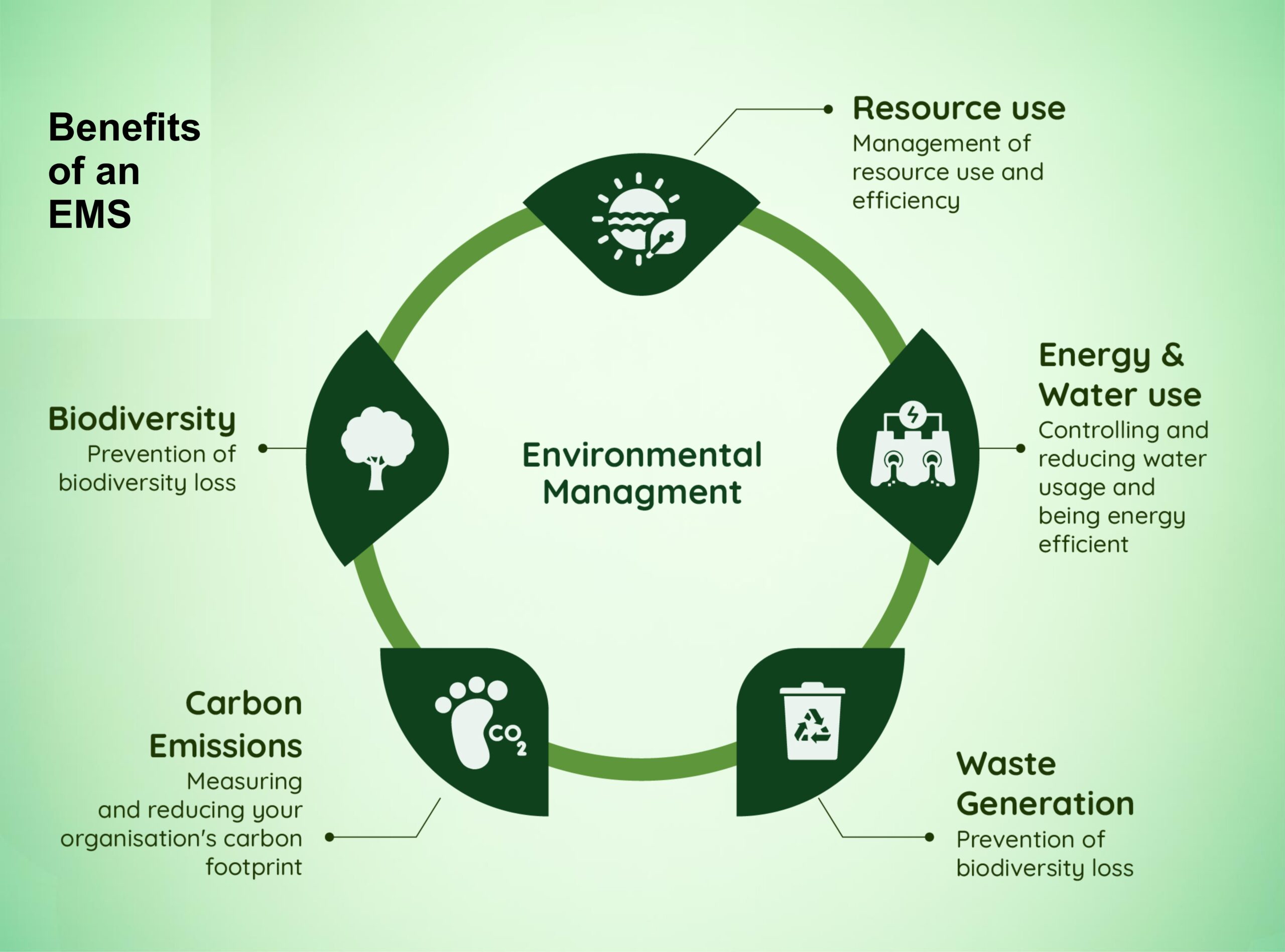
இலங்கையில் சிறிய மற்றும் நடுத்தர தொழில் முனைவுகளுக்கான (SME) துரித சூழல் முகாமைத்துவ முறைமை

புவிக்கோளத்தை பாதுகாப்பது பணத்தைப் பாதுகாக்கும் என்றால் என்ன நடக்கும்? இன்றைய போட்டிச் சந்தையில், பசுமை நிலைமாற்றத்தை அடைவது கோளத்துக்கு மட்டும் நன்மை பயக்கக் கூடியது மட்டுமல்ல – உங்கள் கம்பனியின் அடித்தளத்துக்கும் சிறந்தது. பாரிய வர்த்தக அமைப்புகள் மில்லியன் கணக்கான பணத்தை சூழல் சான்றிதழ்களுக்காக செலவிடும் அதேவேளை, சிறிய மற்றும் நடுத்தர தொழில்முனைவுகள் ISO 14001 போன்ற முறைமைகளை அமுல்படுத்துவதில் உள்ள செலவுகள் மற்றும் அவற்றின் சிக்கல்தன்மைகளுடன் போராடி வருகின்றன. எனினும், உங்கள் இயக்கத்துக்கான செலவுகளைக் குறைத்து, மேலும் வாடிக்கையாளர்களைக் கவர்ந்தவாறு சூழலுக்கு ஏற்படும் தாக்கங்களைக் குறைக்க எளிமையான மற்றும் செலவு குறைந்த ஒரு வழை உள்ளது எனக் கூறினால் எவ்வாறிருக்கும்? இந்த இடத்தில் தான் சூழல் முகாமைத்துவ முறைமைகள் செயற்படுகின்றன, அது எந்த அளவிலும் காணப்படும் வர்த்தகங்களுக்கும் செயற்படும் வகையில் அமைந்த பேண்தகு நிலைக்கான நடைமுறை சாத்தியமான வழியை வழங்குகிறது.
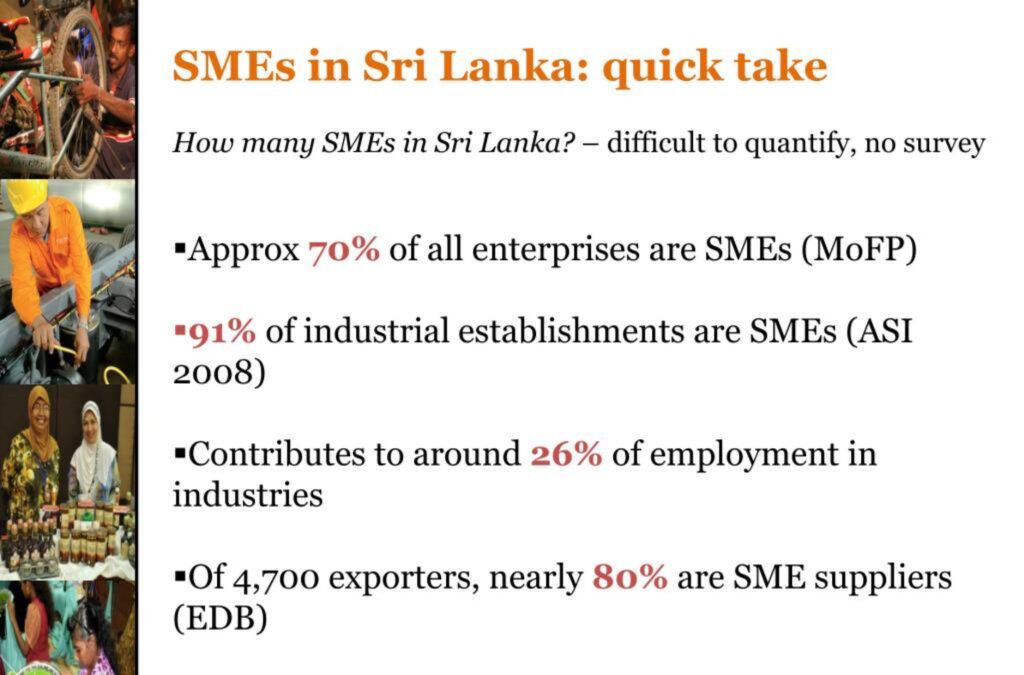
சூழல் முகாமைத்துவ முறைமையின் (EMS) நன்மைகள்
சூழல் அபாய அம்சங்களை அடையாளம் காணல்:அபாயம் இணைந்துள்ள அம்சங்கள், கழிவுகள், முன்னேற்றப்பட வேண்டிய அம்சங்கள் என்பவற்றை அடையாளம் காண வர்த்தகங்கள் ஒரு கட்டமைக்கப்பட்ட அணுகுமுறையைப் பின்பற்றுவதை ISO 14001 போன்ற EMS சான்றிதழ்கள் உறுதி செய்கின்றன. அது வர்த்தகங்கள் வளப் பயன்பாடு, வெளியேற்றங்கள் மற்றும் கழிவு உருவாக்கம் என்பவற்றை வர்த்தகங்கள் மேற்கொள்வதை இயலுமாக்குகின்றது. புவிக் கோளத்தில் ஏற்படும் எதிர்மறையான தாக்கங்களை குறைப்பதற்கு மேலதிகமாக, இந்த நடவடிக்கைகள் சூழல் உணர்வு மிக்க நிறுவனங்கள் என்ற பிரதி விம்பத்தை அவ்வர்த்தகங்கள் கட்டியெழுப்பவும் குறித்த சான்றிதழ்கள் உதவுகின்றன.
செலவு சேமிப்பு மற்றும் வினைத்திறன்: கழிவுகளைக் குறைக்கும் அத்துடன் எரிபொருள் மற்றும் நீர் போன்ற வளங்களின் உவப்பான பயன்பாட்டை நடைமுறைகளை ஊக்குவிப்பதன் மூலம், பயன்பாட்டுக்கான செலவுக் குறைப்பு, மூலப்பொருட்களின் குறைந்த பயன்பாடு, மற்றும் கழிவு அகற்றல் செலவு குறைப்பு போன்றவற்றை அடையும் வகையில் வர்த்தகங்களின் செயற்பாடுகளை ஒருமுகப்படுத்துவதற்கு EMS வழிவகுக்கின்றது. மேலதிகமாக, சூழல் கட்டுப்பாடுகளுக்கு இணங்கி நடக்கும் தன்மையை EMS வளர்க்கிறது, பின்பற்றாமல் இருப்பதற்கு விதிக்கப்படும் பாரிய தண்டப்பணங்களில் இருந்து வர்த்தகங்கள் பாதுகாப்புப் பெறுவதற்கு இது வழி வகுக்கின்றது.மேம்படுத்தப்பட்ட சந்தை போட்டித்திறன்: நுகர்வோர் மற்றும் முதலீட்டாளர்கள் பேண்தகுநிலைக்கு முன்னுரிமையளிப்பது அதிகரித்து வரும் நிலையில், நன்கு நிலைப்படுத்தப்பட்ட ஒரு EMS, சூழல் பொறுப்பாண்மை மீதான செயற்பாடு மிக்க முன்னேற்றத்துக்கு கம்பனி கொண்டுள்ள கடப்பாட்டை எடுத்துக்காட்டுகின்றது. இது சூழல் உணர்வு கொண்ட நுகர்வோர் மற்றும் முதலீட்டாளர்கள் வர்த்தகத்தின் பால் ஈர்க்கப்படுவதை அதிகரிக்கும். இது வர்த்தகத்துக்கு புதிய வாய்ப்புகளை வழங்குவதுடன் சந்தையில் அதன் நிலையை வலுப்படுத்தவும் உதவுகின்றது.
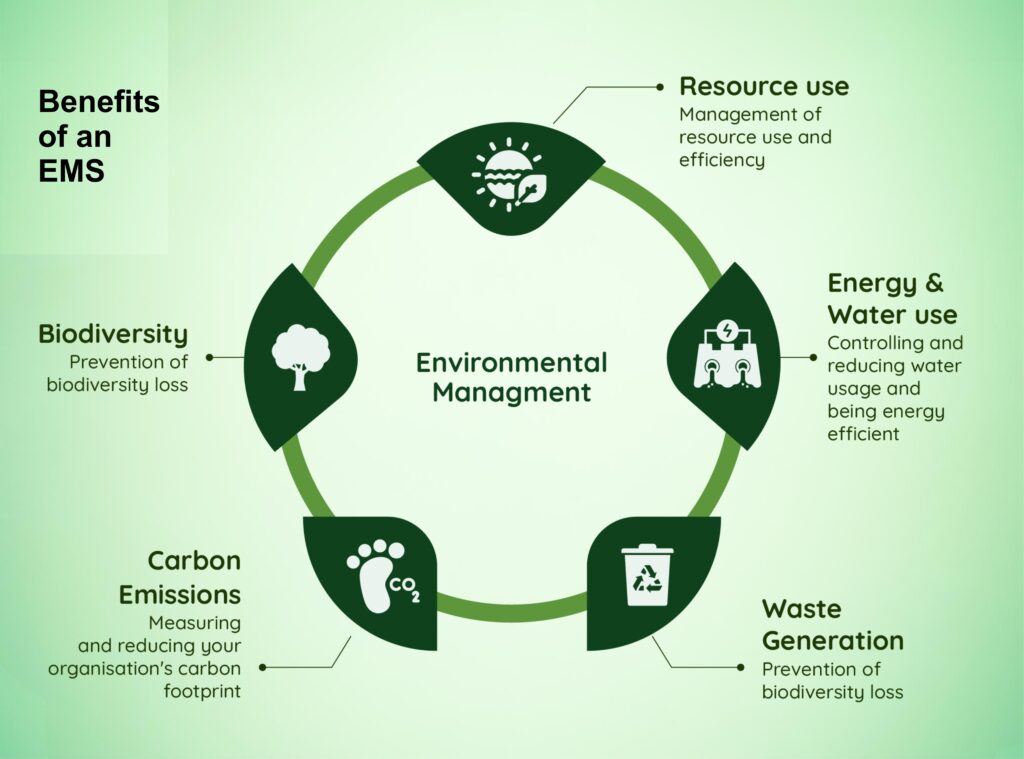
ISO 14001 ஐப் கைக்கொள்வதில் காணப்படும் சவால்கள்
உயர் ஆரம்ப செலவுகள் மற்றும் வளத் தேவைகள்: முறைமையை ஆரம்பிப்பதுடன் தொடர்புடைய செலவுகள் ஒரு குறிப்பிடத்தக்க தடையாக அமைய முடியும், குறிப்பாக இது சிறிய மற்றும் நடுத்தரத் தொழில்முனைவுகளுக்கு (SMEs) பாரிய தடையாக அமைகின்றன. ஒரு EMS ஐ உருவாக்குவதற்கும் ஒருங்கிணைப்பதற்கும் குறிப்பிடத்தக்க நேரம், நிபுணத்துவம் மற்றும் முயற்சி தேவைப்படலாம். மூன்றாம் தரப்பு சான்றழிப்புகளுக்கான செலவுகளும் குறிப்பிடத்தக்கதாக அமைய முடியும், பல வர்த்தகங்கள் இச்செலவுகளுக்கான நியாயப்படுத்தல்களை வழங்க சிரமப்படுகின்றன, விசேடமாக ஒரு EMS இல் மேற்கொள்ளப்படும் முதலீட்டின் அடைவுகள் வெளிப்படையானவை அல்ல என்பதால் இந்நிலை தோன்றுகின்றது.
தொடர்ச்சியான கண்காணிப்பு மற்றும் பராமரிப்பு:தொடர்ச்சியான கண்காணிப்பு, மதிப்பீடு மற்றும் மேம்பாடு ஆகியவற்றிற்கான தேவை நேரம் மற்றும் வளங்கள் இரண்டின் அடிப்படையில் தேவைப்படலாம். பல SME கள், இதனை பெறுமதி சேர்க்கும் நடவடிக்கைகளின் ஒரு தொகுதியாக அல்லாமல் ஒரு தடையாகவே நோக்குகின்றன.
ISO 14001 குறைந்த அளவில் கைக்கொள்ளப்படுவது ஏன்?f ISO 14001 Certification?
ISO 14001 இன் தெளிவான சாத்தியமான நன்மைகள் இருந்தபோதிலும், அதன் அமுல்படுத்தலுடன் இணைந்துள்ள சவால்கள் சார்பளவில் அது குறைவாக கைக்கொள்ளப்படுவதற்கு, விசேடமாக SME கள் மத்தியில் குறைவாக எடுத்துக்கொள்ளப்படுவதற்கு பங்களிக்கும் காரணியாக அமைகின்றது. ஆரம்பச் செலவு, சிக்கல்தன்மை, மற்றும் ஒரு வினைத்திறன் மிக்க EMS தரநிலையை உருவாக்குவதற்கு மற்றும் பேணுவதற்கு எடுக்கும் காலம் காரணமாக பல வர்த்தகங்கள் அதனைக் கைக்கொள்வதற்கு தயங்குகின்றன.
ISO 14001 குறிப்பிடத்தக்க சூழல், நிதியியல் மற்றும் போட்டித்தன்மை நன்மைகளை வழங்கும் அதே வேளை, அதனை கைக்கொள்வதில் இணைந்துள்ள சவால்கள் – குறிப்பாக சிறிய வர்த்தகங்கள் எதிர்கொள்ளும் சவால்கள் அதிகமாகவுள்ளன.
தீர்வு
இச்சவால்களைக் கருத்திற் கொண்டு, ISO 14001 நியமத்தின் சில முக்கிய அம்சங்களுக்கு இணங்கியதாக, SME களுக்கு ஆதரவளிக்க STENUM Asia அமைப்பினால் QEMS உருவாக்கப்பட்டுள்ளது, இது உண்மையான மாற்றத்தை ஏற்படுத்தியவாறு இயக்கத்தின் செய்றபாட்டை மேம்படுத்தும்.
QEMS என்பது SMEகளுக்காக வடிவமைக்கப்பட்ட எளிமைப்படுத்தப்பட்ட, விரைவான ஆனால் பயனுள்ள சுற்றுச்சூழல் முகாமைத்துவ முறைமையாகும். இதில் ISO 14001 இன் குறிப்பிட்ட அம்சங்கள் மற்றும் தேவைப்பாடுகள் கருத்திற்கொள்ளப்படுவதால் ISO 14001 இனை நோக்கிய பயணத்தின் ஒரு எளிமையான மற்றும் முகாமைத்துவம் செய்யக்கூடிய முதலாவது படிநிலையாக QEMS கருதப்படுகிறது. SME களுக்கு பெறுமதி சேர்க்கக் கூடிய ஒரு EMS இன் முக்கிய அம்சங்களில் கவனம் செலுத்தும் அதேவேளை, SME களுக்கு ஏற்படும் சூழல் தாக்கங்களைக் குறைக்கவும் உதவுகின்றது.
SMEகளுக்கான QEMS ஐ செயல்படுத்துவது ஒரு கட்டமைக்கப்பட்ட 8-படிநிலைகள் கொண்ட செயல்முறையாகும், இது 4 நாட்களில் முடிக்கப்படலாம். SME இன் வர்த்தக சூழமைவைப் புரிந்து கொள்ளல் மற்றும் சூழல் முகாமைத்துவ முறைமையின் பரப்பு எல்லையை வரையறை செய்தல் என்பவற்றுடன் இப்பயணம் ஆரம்பமாகின்றது. அதன் பின்னர், முக்கிய அம்சங்களை அடையாளம் காண சூழல்-வரைபடமாக்கல் மதிப்பீட்டை மேற்கொள்ளல்; அத்துடன் ஏற்ற வகையில் அமைந்த சூழல் செயற்பாட்டுத் திட்டத்தை தயாரித்தல் என்பன அடுத்தடுத்த படிநிலைகளாக அமைகின்றன. எமது வழிகாட்டலுடன் SME கள் ஒரு ஒரு சூழல் கொள்கையை உருவாக்கும் அத்துடன் முன்னேற்றத்தை மதிப்பிட முதலாவது முகாமைத்துவ மீளாய்வை நடத்தும். மீளாய்வின் அடிபப்டையில் தேவையான மாற்றங்கள் ஏற்படுத்தப்படும். இணக்கத்தை உறுதிப்படுத்த ஒரு உள்ளக மீளாய்வு மேற்கொள்ளப்படும், அதன் பின்னர் சான்றழிப்பதற்கான பொருத்தப்பாட்டை மதிப்பிட இரண்டாவது முகாமைத்துவ மீளாய்வு நடத்தப்படும்.
தொடர் செயன்முறை முழுவதும், ஆலோசனைகள் மற்றும் ஆவணங்கள் ஊடாக SME கள் வழிநடத்தப்படும், இறுதியாக அவை நீண்ட கால நிலைபேற்றுத்தன்மையை அடையவும் ISO 14001 சான்றிதழை பெறும் சாத்தியத்தை அடையவுமான அடித்தளத்தை அவை பெற்றுக்கொள்ளும்.
QEMS தற்போது இலங்கையில் நான்கு SME களில் செயல்படுத்தப்படுகிறது மற்றும் ஏற்கனவே இந்தியாவில் வேறு சிலவற்றில் நிறுவப்பட்டுள்ளது, அங்கு அவை ஏற்கனவே குறிப்பிடத்தக்க நன்மைகளை வழங்கியுள்ளன
சுற்றுச்சூழல் பொறுப்புக்கான பாதை சிக்கலானதாகவோ அல்லது விலை உயர்ந்ததாகவோ இருக்க வேண்டியதில்லை. SME களின் பேண்தகு நிலைக்கான பயணத்தின் முதலாவது நடைமுறைப் படிநிலையை QEMS வழங்குகின்றது, குறைவடைந்த சேவகள் கட்டணம் மற்றும் உயர்வடையும் சந்தை நற்பெயர் என்பவற்றின் மூலம் அதன் நன்மைகள் விநியோகிக்கப்படுகின்றன. ஒரு வருடத்திற்குள் முதலீட்டின் மீதான நன்மைகளைக் (ROI) காட்டும் வெற்றிக் கதைகள் மற்றும் 30% வரை செயல்பாட்டு செலவு குறைப்புகளுடன், சுற்றுச்சூழல் மேலாண்மை முறையை செயல்படுத்தலாமா என்பது கேள்விக்குரிய விடயம் அல்ல – ஏன் காத்திருக்க வேண்டும்? உங்கள் வர்த்தகத்துக்கான மிகவும் நிலைபேறான மற்றும் இலாபகரமான எதிர்காலத்தை நோக்கி இன்றே முதல் அடியை எடுத்து வையுங்கள்.


ශ්රී ලංකාවේ කුඩා හා මධ්ය පරිමාණ ව්යවසායකයින් සඳහා ඉක්මන් පරිසර කළමනාකරණ පද්ධතිය (QEMS).

පෘථිවිය සුරැකීමෙන් ඔබට මුදල් ඉතිරි කර ගත හැකි නම්? වත්මනෙහි පවතින තරඟකාරී වෙළඳපොළ තුල හරිතකරණයට යොමුවීම පෘථිවියට පමණක් නොව – ඔබේ සමාගමේ ලාභයටද යහපත් වේ. විශාල සමාගම් පාරිසරික සහතික සඳහා මිලියන ගණනින් ආයෝජනයන් සිදු කරන අතර, කුඩා හා මධ්ය පරිමාණ ව්යවසායයන් බොහෝ විට ISO 14001 වැනි කළමනාකරණ පද්ධති ක්රියාත්මක කිරීමේ සංකීර්ණත්වය සහ පිරිවැය සමඟ ගැටෙති. නමුත් මෙහෙයුම් පිරිවැය අඩු කරන අතරතුර වැඩි ගනුදෙනුකරුවන් ගණනක් ආකර්ෂණය කර ගනිමින් ඔබේ ව්යාපාරය මගින් සිදුවන පාරිසරික බලපෑම අඩු කිරීමට සරල, ලාභදායී ක්රමයක් පැවතිණි නම් එය කෙසේ වනු ඇතිද? ඕනෑම ප්රමාණයක ව්යාපාරයක් සඳහා ගැලපෙන මෙන්ම තිරසරබව වෙත ප්රායෝගිකව මගපෙන්වන පාරිසරික කළමනාකරණ පද්ධති කරලියට එන්නේ එතැනිනි.

පාරිසරික කළමනාකරණ පද්ධතියක (EMS) ප්රතිලාභ
පාරිසරික වශයෙන් අවදානම් ක්ෂේත්ර හඳුනා ගැනීම: ISO 14001 වැනි EMS සහතික කිරීම් මඟින් අවදානම් සහගත ක්ෂේත්ර, අපද්රව්ය සහ වැඩිදියුණු කළ යුතු ක්ෂේත්ර හඳුනා ගැනීම සඳහා ව්යාපාර මගින් ව්යුහගත ප්රවේශයක් අනුගමනය කරනු ලබන බව සහතික කරයි, එමඟින් සම්පත් පරිභෝජනය, විමෝචනයන් මෙන්ම අපද්රව්ය අවම කිරීමට ඔවුන්ට ඉඩ සැලසේ. මෙම පියවර ගැනීම ඔස්සේ, එම ව්යාපාරයන් මගින් අපගේ ග්රහලෝකයට සිදුවන ඍණාත්මක බලපෑම් අඩු වනවාට අමතරව, පරිසර හිතකාමී ආයතන ලෙස ඔවුන්ගේ ආයතනික ප්රතිරූපය වැඩි දියුණු වීමද සිදු වේ.
පිරිවැය ඉතිරිකිරීම් සහ කාර්යක්ෂමතාව: අපද්රව්ය අවම කරන්නාවූ මෙන්ම ඉන්ධන පරිභෝජනය සහ ජලය වැනි සම්පත් ප්රශස්ත අයුරින් භාවිතය දිරිමත් කරන්නාවූ ක්රමවේදයන් දිරිමත් කිරීම ඔස්සේ පාරිසරික කළමණාකරණ පද්ධතියකට මෙහෙයුම් විධිමත් කිරීමේ හැකියාව ලැබෙන අතර එමගින් උපයෝගිතා පිරිවැය අවම වීමත්, භාවිතා කරනු ලබන අමුද්රව්ය ප්රමාණය අවම වීම මෙන්ම අපද්රව්ය බැහැර කිරීමේ වියදම් අඩු වීමත් සිදුවේ . මීට අමතරව , පාරිසරික කළමණාකරණ පද්ධතියක් පාරිසරික රෙගුලාසි වලට අනුකූල වීම දිරිගන්වයි, එමඟින් ව්යාපාරයනට අදාළ නීති රීති සහ රෙගුලාසීන්ට අනුකූල නොවීම හේතුවෙන් ගෙවන්නට සිදුවීමට ඉඩ ඇති අධික දඩ මුදල් හෝ දඬුවම් වළක්වා ගත හැකිය.

වැඩිදියුණු කළ වෙළඳපල තරඟකාරිත්වය: පාරිභෝගිකයින් සහ ආයෝජකයින් තිරසාරභාවයට වැඩි ප්රමුඛතාවක් ලබා දෙන විට, මනාව ස්ථාපනය වූ පාරිසරික කළමණාකරණ පද්ධතියක් මගින් පාරිසරික වගකීම වෙනුවෙන් ව්යාපාරයක කැපවීම පෙන්වා දිය හැකි අතර ඒ ඔස්සේ පරිසර හිතකාමී ගනුදෙනුකරුවන් සහ ආයෝජකයින් ආකර්ෂණය කර ගත හැකිය. මෙමගින් නව ව්යාපාරික අවස්ථා සඳහා දොරටු විවෘත කළ හැකි අතර වෙළඳපොල තුළ ව්යාපාරයේ තත්ත්වය ශක්තිමත් කළ හැකිය.
ISO 14001 අනුගමනය කිරීමේදී එල්ල වන අභියෝග
ඉහළ ආරම්භක පිරිවැය සහ සම්පත් අවශ්යතා : විශේෂයෙන්ම කුඩා හා මධ්ය පරිමාණ ව්යවසායයනට මූලික පිරිවැය හා ඒ් ආශ්රිත වියදම් සැලකිය යුතු බාධකයක් විය හැකිය. පාරිසරික කළමණාකරණ පද්ධතියක් ගොඩනැගීමත් එය අන්තර්ග්රහණය කරගැනීමත් සඳහා සැලකිය යුතු කාලයක්, විශේෂඥතාවක් සහ වෑයමක් අවශ්ය විය හැකිය. තෙවන පාර්ශවීය සහතික කිරීමේ පිරිවැය ද සැලකිය යුතු මට්ටමේ විය හැකි අතර, බොහෝ ව්යාපාරයනට මෙය සාධාරණීකරණය කිරීම ගැටළු සහගත වී ඇත්තේ විශේෂයෙන්ම පාරිසරික කළමණාකරණ පද්ධතියක් උදෙසා ආයෝජනය කිරීමෙන් ලැබෙන ප්රතිලාභ ස්පර්ශ්ය(පියවි ඇසට පෙනෙන ආකාරයේ ඒ්වා ) නොවන බැවිනි.
අඛණ්ඩ අධීක්ෂණය සහ නඩත්තුව: අඛණ්ඩ අධීක්ෂණය, ඇගයීම සහ වැඩිදියුණු කිරීම යන දේ සිදුකිරීමේ අවශ්යතාවය කාලය සහ සම්පත් යන අංශ දෙක වෙතින්ම ඉහළ අපේක්ෂාවන් ජනනය කරන සුළු විය හැකිය. බොහෝ කුඩා හා මධ්ය පරිමාණ ව්යාපාරයන්, මෙම අමතර කාර්යයන් රැස බොහෝ විට අගය එකතු කරන ක්රියාකාරකම් මාලාවක් ලෙස නොව බාධාවක් ලෙස දකිති.
ISO 14001 සහතිකය ලබාගැනීමේ ප්රවණතාවය අඩු වීමට හේතුව කුමක්ද?
ISO 14001 හි විභව ප්රතිලාභ පැහැදිලිව දක්නට තිබියදීත්, විශේෂයෙන්ම කුඩා හා මධ්ය පරිමාණ ව්යාපාර තුළ එය ක්රියාත්මක කිරීම හා සම්බන්ධ අභියෝග, එයට සාපේක්ෂව අඩු පිළිගැනීමක් ඇතිකිරීමට දායක වී ඇත. ඵලදායී පාරිසරික කළමණාකරණ පද්ධතියක් ස්ථාපනය කර පවත්වාගෙන යාමට අවශ්ය මූලික පිරිවැය, එහි සංකීර්ණත්වය සහ ඒ සඳහා වැයවන කාලය හේතුවෙන් බොහෝ ව්යාපාරයන් මෙම ප්රමිතිය අනුගමනය කිරීමට මැලිකමක් දක්වති.
ISO 14001 වෙතින් සැලකිය යුතු මට්ටමේ පාරිසරික, මූල්ය සහ තරඟකාරී ප්රතිලාභයන් සපයනු ලැබූවද, විශේෂයෙන් කුඩා ව්යාපාර සඳහා එය ඇතුළත් කර ගැනීම හා සම්බන්ධ අභියෝග සැලකිය යුතු මට්ටමක පවතී.
විසඳුම
මෙය සිහි තබා ගනිමින්, සැබෑ වෙනසක් ජනනය කරන අතරතුර මෙහෙයුම් කාර්යසාධනය ඉහළ නැංවීම පිණිස , ISO 14001 ප්රමිතියේ ඇතැම් ප්රධාන අංග සමඟ පෙළගැසීමට සහය වීම සඳහා ආසියාවේ STENUM හිදී QEMS හෙවත් quick පරිසර කළමනාකරණ පද්ධතිය (QEMS) ගොඩනගා තිබේ.
QEMS යනු සරල කරවන ලද එමෙන්ම වේගවත් නමුත් කුඩා හා මධ්ය පරිමාණ ව්යවසායකයන් සඳහා සකස් කර ඇති ඵලදායී පාරිසරික කළමනාකරණ පද්ධතියකි, ISO 14001 හි ඇතැම් අංශ හෝ අවශ්යතා කේන්ද්රගතව ඇති බැවින්, මෙම පියවර ISO 14001 වෙත සරල හා වඩා කළමනාකරණය කළ හැකි පළමු පියවරක් ලෙස සැලකේ. QEMSයොමු මගින් සිදු වන්නේ කුඩා හා මධ්ය පරිමාණ ව්යවසායය සඳහා වටිනාකමක් ලබා දෙන පාරිසරික කළමණාකරණ පද්ධතියෙහි ප්රධාන අංශ කෙරෙහි අවධානය යොමු කරන අතරම, කුඩා හා මධ්ය පරිමාණ ව්යවසායය මගින් වන පාරිසරික බලපෑම අඩු කිරීමට ද QEMS උපකාරී වේ.

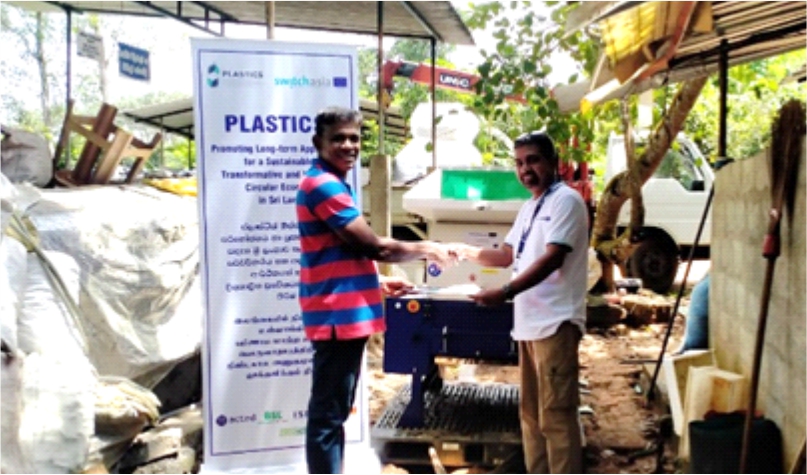
மூலோபாய சொத்து ஆதரவு மூலம் சிறிய மற்றும் நடுத்தர தொழில்முனைவுகளை (SME) ஊக்குவித்தல்

பிளாஸ்டிக் பெறுமதிச் சங்கிலியை ஒரு அர்ப்பணிப்பு மிக்க முயற்சியின் மூலம் நிலைமாற்றுவதன் ஊடாக, சிறிய மற்றும் நடுத்தர தொழில்முனைவுகள் (SME) புத்தாக்கம் மற்றும் செயற்பாட்டு மேன்மை என்பவற்றை வளர்த்தெடுக்கும் வகையில் அவற்றை முக்கிய சொத்துக்களைக் கொண்டனவாக ஆக்குவதன் ஊடாக PLASTICS திட்டம் ஒரு முன்னுதாரணத்தை ஏற்படுத்தியுள்ளது. இந்த சொத்துகள் வெறும் கருவிகள் அல்ல, பேண்தகுநிலையான வளர்ச்சி மற்றும் தொழிற்துறையின் தலைமைத்துவம் என்பவற்றை SME களுக்கு வழங்கும் ஊக்கிகளாக அவை காணப்படுகின்றன.
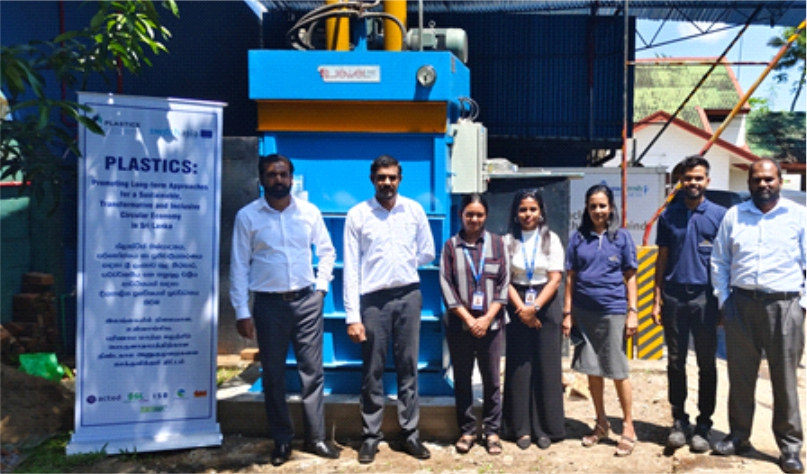

ஒத்துழைப்பு முதலீடு
இந்த திட்டத்தில் பங்கேற்கும் SMEகள் இந்த சொத்துக்களுக்கான நிதிச் செலவுகளில் 50% பங்களிப்பதன் மூலம் தங்கள் கடப்பாட்டை எடுத்துக்காட்டுகின்றன. இந்த பகிரப்பட்ட முதலீடு ஒரு உரிமத்துவ உணர்வை வழங்குவது மாத்திரமன்றி, அதிக பேண்தகுநிலை மிக்க மற்றும் இலாபமீட்டும் ஒரு எதிர்காலத்தைக் கட்டியெழுப்ப முதலிடும் தரப்புகளின் நீண்ட கால ஈடுபாட்டை திடப்படுத்தும்.
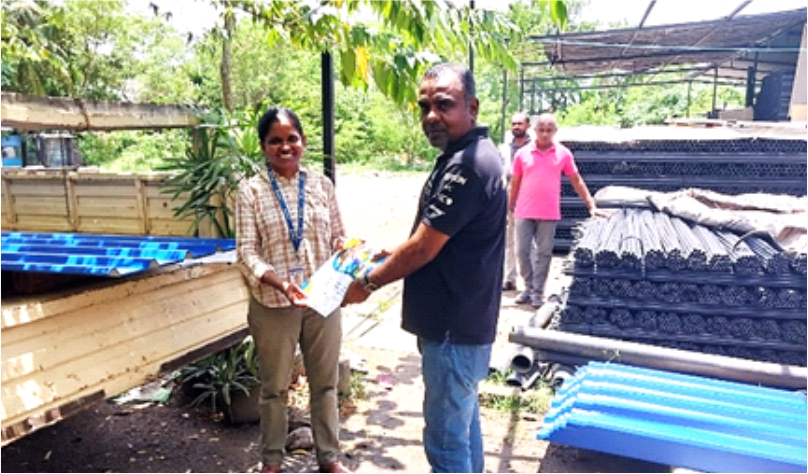
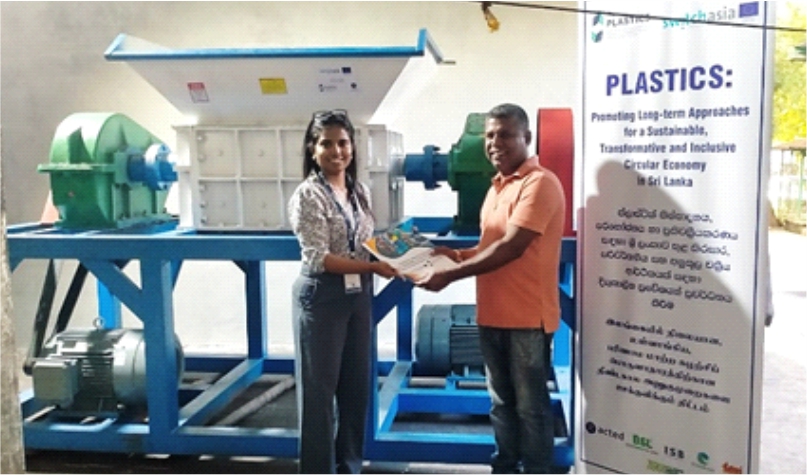
ஏற்ற வகையில் உருவாக்கப்பட்ட தீர்வுகள்
அனைத்து தொழில்முனைவுகளுக்கும் ஒரே தீர்வு பொருந்தும் என்ற எண்ணக்கருவில் சொத்துக்கள் வழங்கப்படுவதில்லை, மாறாக ஒவ்வொரு வர்த்தகத்தினதும் தனித்துவம் தேவைகளைப் பூர்த்தி செய்யும் வகையில் அவற்றுக்கான சொத்துத் தீர்வுகள் உருவாக்கப்படுகின்றன. இந்த தனிப்பயனாக்கம் பின்வருவனவற்றை அடிப்படையாகக் கொண்டது:
- தொழில்முனைவின் இயலுமை மதிப்பீட்டுக் கருவியின் (ECAT) மூலம் நிபுணர் மதிப்பீடுகள்: தொழில்முனைவுகளின் இயலுமை, பலங்கள், மற்றும் பலவீனங்களை மதிப்பீடு செய்தல்.
- வள வினைத்திறன் மற்றும் தூய்மையான உற்பத்தி (RECP) திட்டங்கள்: வளங்களை வினைத்திறனுடன் பயன்படுத்தல், அத்துடன் கழிவு உருவாக்கம் சூழல் சேத அடையாளங்கள் என்பன குறைக்கப்படுவதை உறுதி செய்தல்.
- தனிப்பட்ட வர்த்தக மூலோபாயங்கள்: SME களின் வளர்ச்சி இலக்குகள் மற்றும் சந்தை வாய்ப்புகளுடன் சொத்துக்களை ஒன்றிணைத்தல்.
இந்த ஆழ்ந்த அறிவினை இலக்கு வைக்கப்பட்ட சொத்து ஒதுக்கலுடன் ஒன்றிணைப்பதன் மூலம், தொழில்முனைவுகள் தமது சவால்களை வெற்றிகொள்ளவும் பயனுறுதி மிக்க வகையில் புதிய வாய்ப்புகளை கைப்பற்றவும் வர்த்தகங்கள் தயார்நிலையில் இருப்பதை இந்தத் திட்டம் உறுதி செய்கிறது.
புத்தாக்கம் மற்றும் பேண்தகுநிலை
இந்த சொத்துக்களின் தாக்கம் உடனடி இயக்க மேம்பாட்டுக்கும் மிகவும் அப்பால் நன்மை பயக்கக் கூடியது. அவை SME களுக்கு பின்வருவனவற்றைச் செயல்படுத்துகின்றன:
- இயலுமைகளை விரிவாக்குதல்: உயர்த்தப்பட்ட உற்பத்தி தொழில்நுட்பங்கள், புத்தாக்கம் மிக்க மீள்சுழற்சி பொறிமுறைகள் அல்லது வள வினைத்திறன் மிக்க தொடர் செயன்முறைகள் போன்ற எந்த வழிமுறைகள் ஊடாகவும், வர்த்தகத்தை பாரிய சந்தைகளுக்கு எடுத்துச் செல்ல இந்த சொத்துக்கள் வர்த்தகத்தை வலுப்படுத்துகின்றன.
- புதிய முன்னெடுப்புகளைத் தொடங்குதல்: முன்னர் தேடுதலுக்கு உட்படுத்தப்படாத புதிய வர்த்தக விடயதானங்களுக்குள் பல SME கள் நுழைந்துள்ளன, அவை வழங்கும் உற்பத்தி மற்றும் சேவைகள் பல்வகைப்படுத்தப்பட்டு பெறுமதி உருவாக்கம் முன்கொண்டு செல்லப்படுகிறது.
- பேண்தகுநிலை ஊக்குவிப்பு: பிளாஸ்டிக் பெறுமதிச் சங்கிலியில் உள்ள சிறந்த நடைமுறைகளை கைக்கொள்வதன் மூலம், கழிவுகளைக் குறைப்பதற்கும் சுழற்சிப் பொருளாதார கொள்கைகளை தழுவிக்கொள்ளவும் இந்த வர்த்தகங்கள் பங்களிக்கின்றன.
செயற்பாட்டில் நிலைமாற்றம்
அத்தகைய ஒரு SME, எவ்வாறு பாரம்பரிய உற்பத்தியில் இருந்து மீள்சுழற்சி செய்யப்பட்ட பிளாஸ்டிக்குகளை தங்கள் தயாரிப்பு வரிசையில் இணைத்து, பெரிய ஆர்டர்களை நிறைவேற்றவும், பாரிய உற்பத்தி வாய்ப்புகளைத் தேடவும் நிறுவனத்தை திட்டத்தின் ஆதரவு எவ்வாறு அனுமதித்தது என்பதைப் பகிர்ந்து கொண்டது. புதிய இயந்திரங்கள் மற்றும் தொழில்நுட்ப நுண்ணறிவுகள் உற்பத்தி செலவுகளைக் குறைத்தது மட்டுமல்லாமல், சுற்றுச்சூழல் உணர்வுள்ள பிராண்டாக அவற்றின் சந்தை நிலையை உயர்த்தியுள்ளன.
மாற்றத்தின் அதிர்வு விளைவு
PLASTICS திட்டத்தின் மூலம், SME கள் தமது தனிப்பட்ட இயக்கங்களை மேம்படுத்துவது மாத்திரமன்றி, தொழிற்துறையில் பேண்தகுநிலை மிக்க நடைமுறைக்கான அடையாளங்களையும் ஏற்படுத்துகின்றன. ஒத்துழைப்பு முயற்சிகளுடன் மூலோபாயத்துவம் மிக்க முதலீடுகள் வர்த்தகங்கள், சமூகங்கள் மற்றும் சூழலில் அர்த்தபூர்வமான மாற்றங்களை ஏற்படுத்தும் என்பதை இந்த முன்னெடுப்பு எடுத்துக்காட்டுகிறது.
SME கள் செழிப்படைய அவற்றை வலுவூட்டுவதன் மூலம் PLASTICS திட்டம் புத்தாக்கம் மற்றும் பேண்தகுநிலையை வளர்த்தெடுப்பதற்கான ஒரு மாதிரியை உதாரணமாக வழங்குகிறது, அது அதிக தாங்குதிறன் மற்றும் பொறுப்பு மிக்க எதிர்காலத்துக்கான ஒரு பாதையை அமைக்கிறது.


උපාය මාර්ගික වත්කම් සහාය හරහා කුඩා හා මධ්ය පරිමාණ ව්යවසායයන් ඉහළ නැංවීම

ප්ලාස්ටික් අගය දාමය පරිවර්තනය කිරීමෙහි ලා කැපවුණු උත්සාහයන් ඔස්සේ නවෝත්පාදනයන් මෙන්ම මෙහෙයුම්හි විශිෂ්ටත්වය වැඩිදියුණු කිරීම සඳහා කුඩා හා මධ්ය පරිමාණ ව්යවසායයන් (SMEs) තීරණාත්මක වත්කම්වලින් සන්නද්ධ කිරීම ඔස්සේ PLASTICS ව්යාපෘතිය පූර්වාදර්ශයක් සපයා තිබේ. මෙම වත්කම් හුදෙක් මෙවලම් පමණක්ම නොව,තිරසර සංවර්ධනය මෙන්ම කර්මාන්ත නායකත්වය යනාදිය සඳහා උත්ප්රේරකයන්ද වේ.


සාමූහික ආයෝජන
මෙම ව්යාපෘතියට සහභාගී වන කුඩා හා මධ්ය පරිමාණ ව්යවසායයන්, මෙම වත්කම් සඳහා මූල්ය පිරිවැයෙන් 50% ක් ප්රදානය කිරීමෙන් මේ සඳහා ඔවුන්ගේ කැපවීම පෙන්වා දෙති . මෙම හවුල්/ සහයෝගී ආයෝජනය මගින් හිමිකාරිත්වය පිළිබඳ හැඟීමක් ඇති කරනවා පමණක් නොව, වඩාත් තිරසාර හා ලාභ උපදවන අනාගතයක් ගොඩනැගීම පිණිස වන ඔවුන්ගේ දිගුකාලීන සම්බන්ධතාවය වඩාත් සවිමත් කරයි.


සකස් කළ විසඳුම්
මෙහිදී සපයනු ලබන වත්කම් සියළුම ගැටළුවලට සරිලන එක් විසඳුමක් යන ස්වරූපයේ ඒ්වා නොවූවද ඒ්වා ප්රවේශමෙන් සකසා ඇත්තේ සෑම ව්යාපාරයකම වන එම ව්යාපාරයට අනන්ය වූ අවශ්යතා සපුරාලීම ඉලක්ක කරගනිමිනි. මෙම අභිරුචිකරණය පහත කරුණු මත පදනම් ව ඇත.
- ව්යවසායයෙහි ධාරිතාව ඇගයීමේ මෙවලම (ECAT) ඔස්සේ සිදුකෙරෙන විශේෂඥ මට්ටමේ ඇගයුම් : ව්යවසායන්හි ධාරිතාව, ශක්තීන් සහ දුර්වලතාවන් ඇගයීම.
- සම්පත් කාර්යක්ෂම ලෙස භාවිතය හා සුපිරිසිදු නිෂ්පාදන (RECP) සැලසුම්: සම්පත් කාර්යක්ෂමව භාවිතා කරන බව සහතික කිරීම, නාස්තිය සහ පාරිසරික පියසටහන් අවම කිරීම.
- තනි ව්යාපාර සඳහා උපාය මාර්ගයන් : කුඩා හා මධ්ය පරිමාණ ව්යවසායයන්හි වර්ධන ඉලක්ක සහ වෙළඳපොළ අවස්ථාවවන් සමඟ වත්කම් පෙළගැස්වීම.
ඉහත අවබෝධ කරගත් කරුණු ඉලක්කගත අයුරින් වත්කම් වෙන් කිරීම සමඟ පෙළගස්වා ගැනීම ඔස්සේ අභියෝගවලට මුහුණ දීමේ මෙන්ම ඵලදායී ලෙස නව අවස්ථාවන් අත්පත් කර ගැනීමේ හැකියාවන්ගෙන් ව්යවසායයන් සන්නද්ධ වන බව ව්යාපෘතිය සහතික කරයි.
නවෝත්පාදනයන් සහ තිරසරභාවය
මෙම වත්කම් මගින් ජනිත කරවන බලපෑම මෙහෙයුම්හි ක්ෂණික වැඩිදියුණුවීම් වලට වඩා බොහෝ ඔබ්බට විහිදේ. ඒ මගින් කුඩා හා මධ්ය පරිමාණ ව්යවසායයන් හට පහත දේ සාක්ෂාත් කර ගැනීමේ අවස්ථාව සලසා දී ඇත.
- තම හැකියාවන් පුළුල් කරගැනීම : වැඩිදියුණු කළ නිෂ්පාදන තාක්ෂණයන්, නිර්මාණශීලී මෙන්ම නව ප්රතිචක්රීකරණ යාන්ත්රණයන් හෝ සම්පත්-කාර්යක්ෂම ලෙස භාවිතා කරමින් සිදුකරන සැකසුම් හරහා වේවා, මෙම වත්කම් ව්යාපාරයනට විශාල වෙළඳපොළවල් අත්පත් කර ගැනීමට අවශ්ය දිරිගැන්වීම් සපයයි.
- නව මූලාරම්භයන් දියත් කිරීම : බොහෝ කුඩා හා මධ්ය පරිමාණ ව්යවයසායයන් ඔවුන් මින් පෙර ගවේෂණය නොකළ ක්ෂේත්රවලට පිවිස ඇති අතර, තම නිපැයුම් විවිධාංගීකරණය කරමින් වටිනාකම් නිර්මාණය කිරීමට දායක වෙති. .
- තිරසරභාවය ප්රවර්ධනය කිරීම : ප්ලාස්ටික් අගය දාමයේ වන හොඳම භාවිතයන් අනුගමනය කිරීමෙන්, මෙම ව්යාපාරයන් කසළ අවම කිරීමට සහ චක්රීය ආර්ථික මූලධර්ම වැළඳ ගැනීමට දායක වේ.
පරිවර්තනය ක්රියාත්මක වෙමින්
එවන් එක් කුඩා හා මධ්ය පරිමාණ ව්යවසායයක්, වඩා විශාල ඇණවුම් සැපයීමෙහි මෙන්ම තොග නිශ්පාදන අවස්ථාවන් ගවේෂණය කිරීමෙහි ලා ඉඩ සලසමින් සාම්ප්රදායික නිශ්පාදන ක්රමවේදයන්හි සිට තම නිපැයුම් පෙළට ප්රතිචක්රීකරණය කරන ලද ප්ලාස්ටික් එක් කර ගැනීම දක්වා පරිවර්තනය වීමට ව්යාපෘතියේ සහාය තමන්හට ඉඩ සැලසූ ආකාරය අප සමගින් හුවමාරු කරගනු ලැබිණි. මෙහිදී මෙම නව යන්ත්රෝපකරණ සහ තාක්ෂණික අවබෝධයන් නිෂ්පාදන පිරිවැය අඩු කළා පමණක් නොව, පරිසර හිතකාමී වෙළඳ නාමයක් ලෙස ඔවුන්ගේ වෙළඳපල ස්ථානගත කිරීම ද ඉහළ නංවා ඇත.
වෙනස් වීමේ රැළි බලපෑම්
PLASTICS ව්යාපෘතිය හරහා, කුඩා හා මධ්ය පරිමාණ ව්යවසායයන් තම ස්වාධීන මෙහෙයුම් වැඩිදියුණු කරගැනීම පමණක් නොව, කර්මාන්ත ක්ෂේත්රය තුළ තිරසර ව්යාපාරික භාවිතයන් සඳහා අවශ්ය මිණුම් සලකුණු සැකසීම ද සිදු කරති . මෙම මුලපිරීම, සහයෝගී උත්සාහයන් සමඟ ඒකාබද්ධව ක්රියාත්මක වන උපායමාර්ගික ආයෝජනයනට ව්යාපාර, ප්රජාවන් සහ පරිසරය සඳහා අර්ථවත් වෙනසක් ඇති කළ හැකි ආකාරය ප්රදර්ශනය කරයි.
කුඩා හා මධ්ය පරිමාණ ව්යවසායයන්හි වැඩිදියුනුව සවිබලගැන්වීමෙන්, PLASTICS ව්යාපෘතිය නවෝත්පාදනය සහ තිරසාරභාවය පෝෂණය කිරීම සඳහා ආදර්ශයක් සපයන අතර, වඩාත් ඔරොත්තු දෙන සහ වගකිවයුතු අනාගතයකට මග පාදයි.

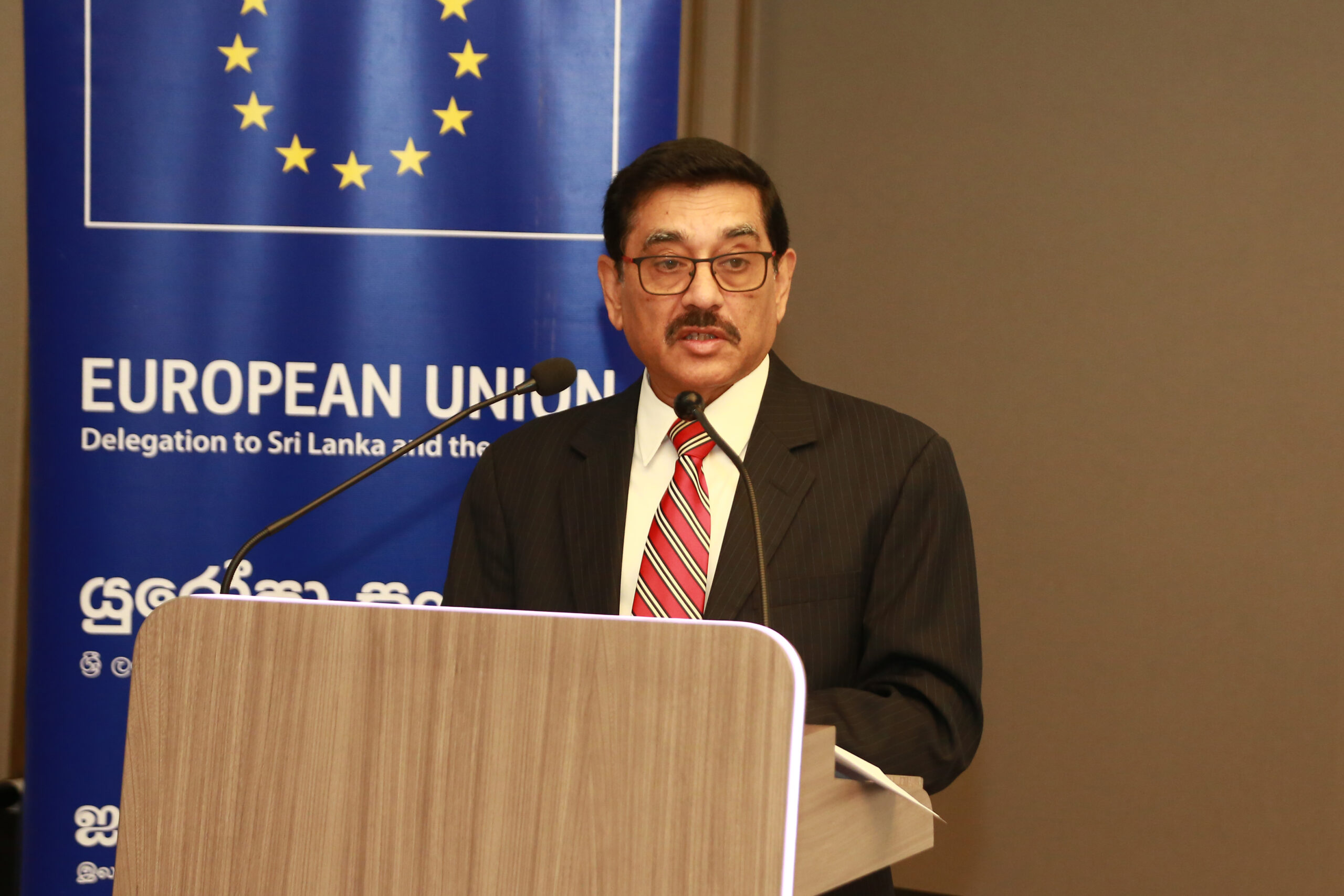
வர்த்தகங்களுக்கு பசுமை நிதியிடல் சேவைகளை வழங்குதல் பற்றிய மூலோபாய விளக்கவுரை

இலங்கையில் வர்த்தகங்களுக்கு பசுமை நிதியிடல் சேவைகளை வழங்குதல் பற்றிய மூலோபாய விளக்கவுரை வழங்குதல் நிகழ்வு இலங்கையில் பேண்தகு நிலை மிக்க நிதியிடல் பற்றிய கலந்துரையாடலை முன்னெடுக்க நிபுணர்களை ஒன்றிணைத்த நிகழ்வாகவும் அமைந்தது. உலகளாவிய காலநிலை நெருக்கடியைத் தீர்க்கவும் அத்துடன் ஒரு தாங்குதிறன் மிக்க பொருளாதாரத்தைக் கட்டியெழுப்பவும் நிதியியல் முறைமைகளை காலநிலை இலக்குகளுடன் ஒன்றிணைப்பதன் அவசரத் தேவையை இந்த நிகழ்வு கோடிட்டுக் காட்டியது. நிதியியல் இடைவெளிகளை இணைப்பதில் மற்றும் பசுமைப் பொருளாதார வளர்ச்சியை ஊக்குவிப்பதில் நிதியியல் நிறுவனங்களின் வகிபாகத்தை முக்கிய கலந்துரையாடல்கள் சுட்டிக்காட்டின.
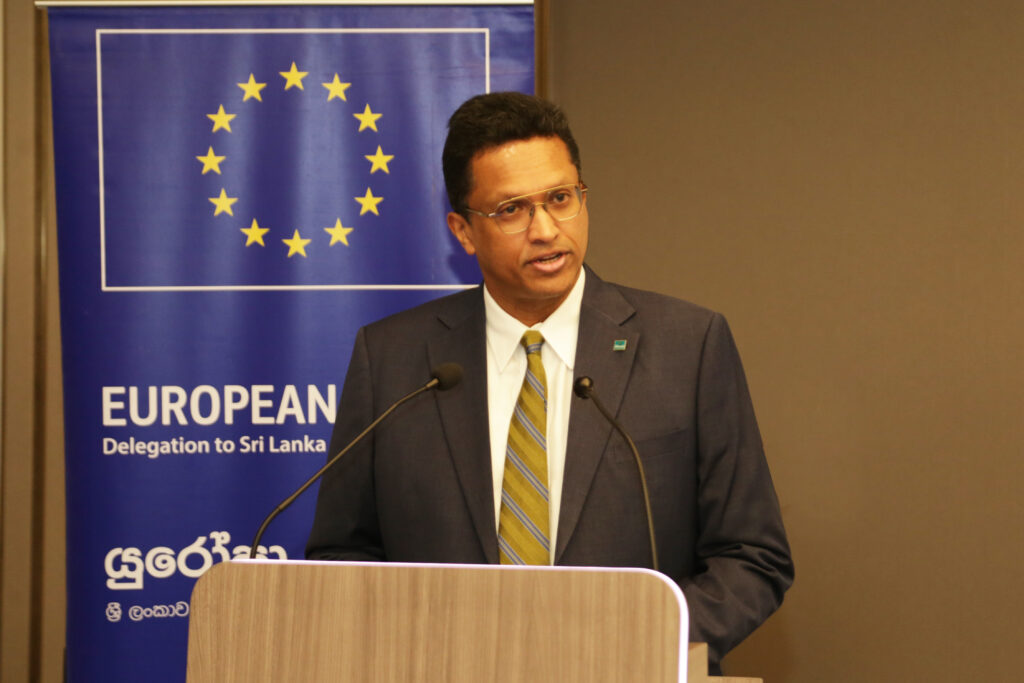
திரு டில்ஹான் சீ. பெர்னாண்டோ, இலங்கையில் பல்வகைத்தன்மை (Biodiversity Sri Lanka / BSL) அமைப்பின் தவிசாளர், உலக வெப்பமடைதலை 1.5°C வரை மட்டுப்படுத்துவதற்கான மிகக் குறைந்த வாய்ப்புகள் உள்ளடங்கலாக, COP29 மாநாட்டில் குறிப்பிடப்பட்ட தீவிர காலநிலை அபாயங்கள் பற்றி வலியுறுத்திக் கூறினார். இலங்கை போன்ற அபிவிருத்தி அடைந்து வரும் நாடுகளில் காலநிலைத் தாக்கங்களைத் தடுப்பதற்கு உடனடி நிதியியல் முதலீடுகள் மேற்கொள்ளப்பட வேண்டும் என்ற கோரிக்கையையும் அவர் முன்வைத்தார். சுழற்சிப் பொருளாதாரத் தீர்வுகளை முன்னேற்றுவதில், ஐரோப்பிய நிதியுதவியுடன் முன்னெடுக்கப்படும் சுவிட்ச் ஆசியா (Switch Asia) திட்டத்தில் BSL அமைப்பின் ஒத்துழைப்பு ஒரு முக்கிய அம்சம் எனப் பாராட்டப்பட்டது. நாட்டின் பசுமை நிலைமாற்றத்துக்கு ஆதரவளிக்கும் வகையில் பசுமை நிதியிடல் சூழலை வளர்த்தெடுப்பதில் மத்திய வங்கி ஆளுநரின் ஈடுபாடு முக்கியமானது என்பதும் சுட்டிக்காட்டப்பட்டது.
2050 ஆம் ஆண்டளவில் கால்நிலை நடுநிலையை எட்டுவதை இலக்காகக் கொண்ட ஐரோப்பிய ஒன்றியத்தின் பசுமை ஒப்பந்தத்தை (Green Deal) பற்றிய ஆழ்ந்த நோக்குகளை இலங்கை மற்றும் மாலைதீவுக்கான ஐரோப்பிய ஒன்றிய தூதுக்குழுவின் ஒத்துழைப்புக்கான குழுத்தலைவர் கலாநிதி ஜோஹ்ன் எச் ஹெஸ்ஸே பகிர்ந்து கொண்டார். இலங்கையின் முதலாவது பசுமைப் பிணைமுறியின் அங்குரார்ப்பணம் போன்ற மைல்கற்களை பாராட்டிய அவர், தகவல் இடைவெளிகள் மற்றும் மட்டுப்படுத்தப்பட்ட அளவிலான தனியார் முதலீட்டுப் பொறிமுறைகள் போன்ற தடைகளை அகற்றுவதன் முக்கியத்துவத்தையும் வலியுறுத்தினார். சுவிட்ச் ஆசியா திட்டத்தின் கீழ் முன்னெடுக்கப்படும் பிளாஸ்டிக் முகாமைத்துவ முன்னெடுப்பு உள்ளடங்கலாக சுழற்சி பொருளாதார முன்னெடுப்புகளுக்கு ஐரோப்பிய ஒன்றியம் தொடர்ச்சியாக வழங்கும் ஆதரவுகளையும் அவர் சுட்டிக்காட்டினார். மேலும், இலங்கையின் நிதியியல் துறையை வலுப்படுத்துவதில் பங்காண்மைகளின் முக்கியத்துவத்தையும் எடுத்துரைத்தார்.
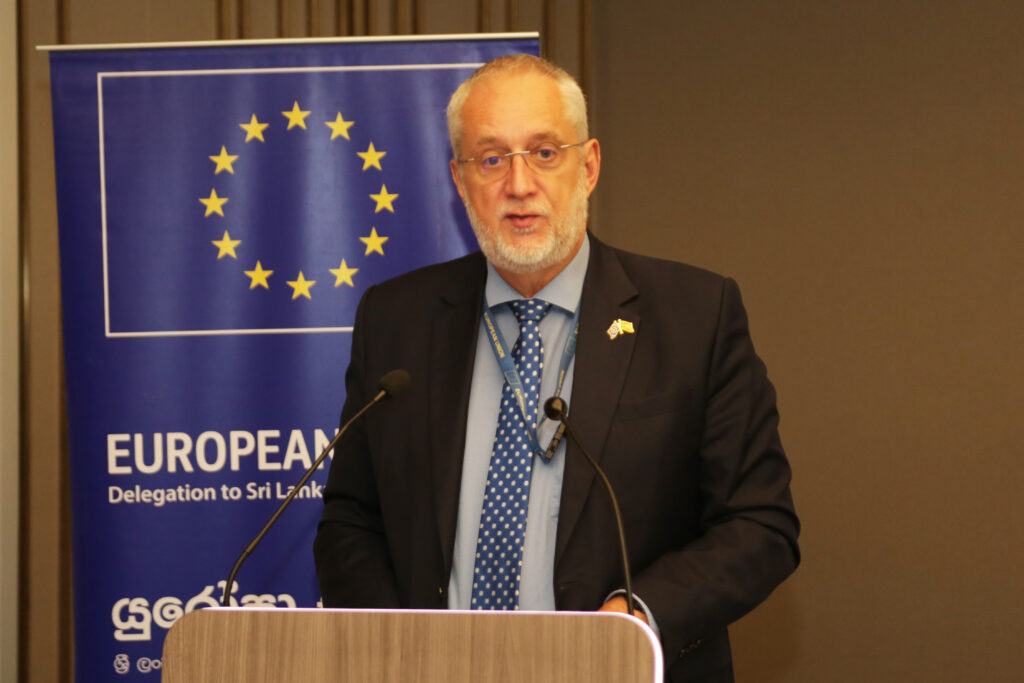
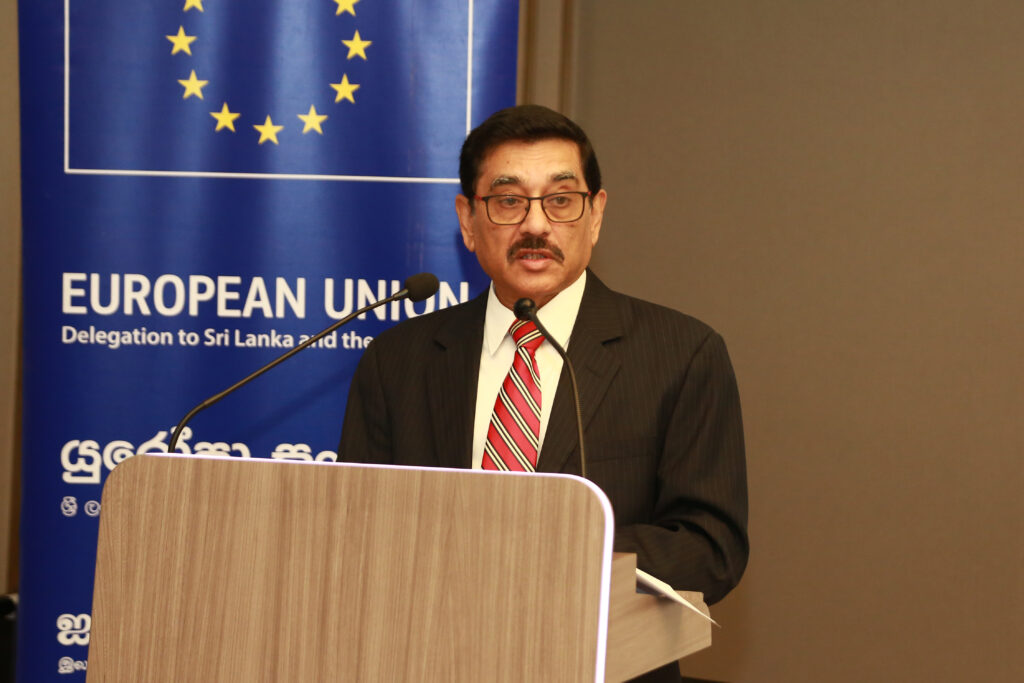
பிரதம பேச்சாளரான மத்திய வங்கி ஆளுநர் கலாநிதி நந்தலால் வீரசிங்க, தனது உரையில் காலநிலை அபாயங்களை தீர்ப்பதன் உலகளாவிய முக்கியத்துவம் பற்றி கவனம் செலுத்தியிருந்தார். வரியிறுப்பாளர்களின் நிதி மூலம் முன்னெடுக்கப்படும் செயற்பாடுகள் குறைவாக உள்ளதை சுட்டிக்காட்டிய அவர், தனியார் துறை முதலீடுகளைக் கவர்வதற்கு புத்தாக்கம் மிக்க நிதியியல் உபகரணங்களின் தேவையையும் எடுத்துரைத்தார். பேண்தகு நிலை கொண்ட நிதியிடல் தொடர்பில் 2019 வழிவரைபடம் மற்றும் 2022 இன் பசுமை நிதி வகைப்படுத்தல் போன்ற இலங்கை மத்திய வங்கி அடைந்த முன்னேற்றங்களையும் அவர் கோடிட்டுக் காட்டினார். தொற்றுநோய் ஏற்படுத்திய சவால்களுக்கு மத்தியிலும், பயிற்சி மற்றும் சர்வதேச ஒத்துழைப்புகள் மூலம் நிதித்துறையின் இயலுமை விருத்திக்கு மத்திய வங்கி பணியை முன்னெடுத்தது. பேண்தகு நிலை மிக்க நிதியியல் சட்டகவடிவங்களை மேலும் பரந்ததாக ஆக்குவதற்கு சமூக மற்று சூழல் பரிசீலனைகளை உள்வாங்கும் வகையில் ஒரு புதிய வழிவரைபடம் தயாரிக்கப்பட்டு வருகிறது. வளர்ந்து காலநிலை அபாயங்கள நிவர்த்தி செய்வதற்கு, கட்டுப்பாட்டு நடவடிக்கைகளுடன் ஏற்றவகையில் மாற்றி அமைப்பதற்கான நிதியிடலின் முக்கியத்துவத்தையும் கலாநிதி வீரசிங்க வலியுறுத்தினார். இலங்கையின் பேண்தகுநிலை மிக்க நிதியியல் முன்னேற்றத்தில் காணப்படும் இடைவெளிகளை அகற்றுவதற்கு புத்தாக்கம் மிக்க நிதியியல் உற்பத்திகளின் உருவாக்கத்துக்கான கோரிக்கையை அவர் முன்வைத்தார். பேண்தகுநிலையை வளர்த்தெடுத்தல் மற்றும் மற்றும் பசுமை அபிவிருத்தியை நோக்கிய கலாச்சார மாற்றத்தை உருவாக்குவதில் மத்தியின் வங்கியின் கடப்பாட்டை ஆளுநர் மீளுறுதி செய்தார்.
பசுமை நிதியிடல் மற்றும் தூய்மையான தொழில்நுட்ப தீர்வுகள் மூலம் ஒரு சுழற்சிப் பொருளாதாரத்தை மேம்படுத்துவதை நோக்கமாகக் கொண்ட ஐரோப்பிய ஒன்றியத்தின் சுவிட்ச் ஆசியா திட்டம் பற்றி BSL அமைப்பின் பசுமை நிதியியல் நிபுணர் திரு எர்ரோல் அபேரத்னவின் அளிக்கை ஒன்றும் நிகழ்வில் உள்ளடங்கியிருந்தது. சாத்தியத்தன்மை பற்றிய ஆய்வுகள், நிதியியல் அமைப்புகளை வெளிச்சென்றடைதல், அத்துடன் SME களுக்கான இயலுமை விருத்தி பயிற்சி நிகழ்ச்சித்திட்டங்கள் என்பன இத்திட்டம் அடைந்த முக்கிய வெற்றிகளுள் அடங்குகின்றன. அமைப்பு ரீதியான ஈடுபாட்டை அதிகரித்தல் மற்றும் காலநிலை ஆபத்து நிதியிடலுக்கு கொடை வழங்குனர்களின் முதலீட்டு உந்து சக்தியை வழங்குதல் என்பவற்றில் இத்திட்டத்தின் எதிர்கால முன்னெடுப்புகள் கவனம் செலுத்தவுள்ளன.
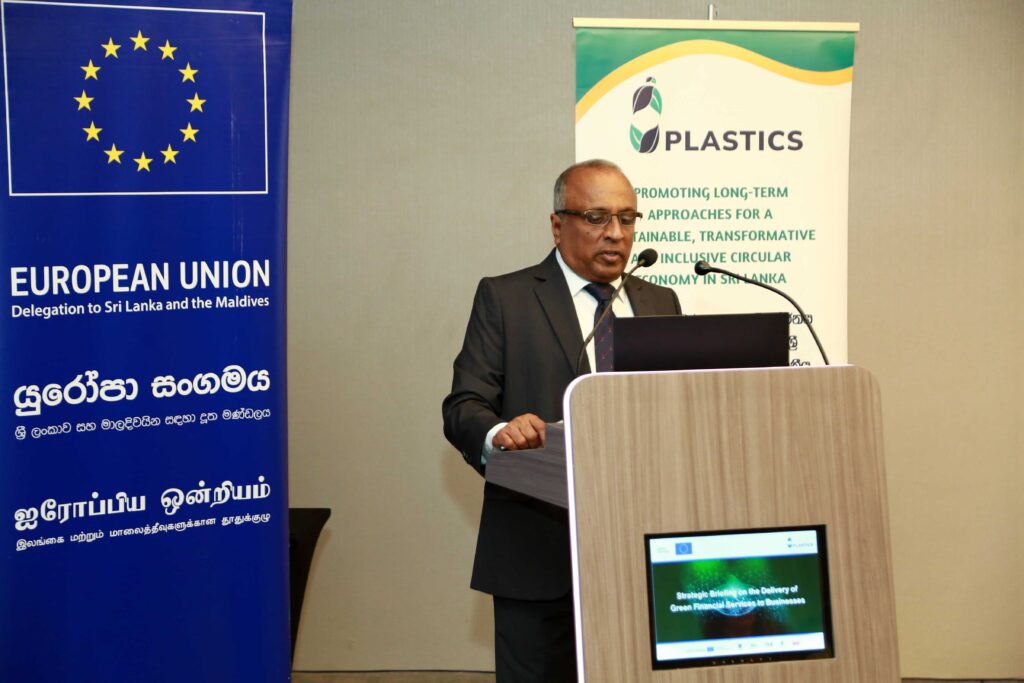
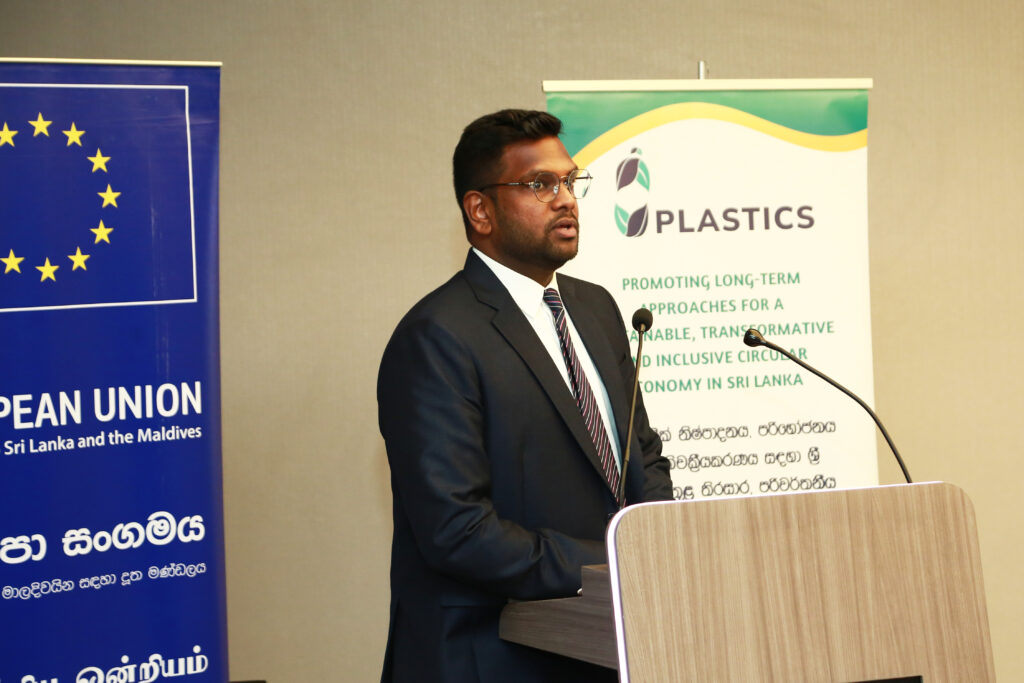
இறுதியாக, பசுமை முதிர்ச்சி மதிப்பீட்டில் கண்டறியப்பட்ட விடயங்களை ஒரு ஸ்மார்ட் எதிர்காலத்துக்கான நிலையத்தின் (Centrer for a Smart Future) அமைப்பின் இணை ஸ்தாபகர் திரு அனுஷ்க விஜேசிங்க அளிக்கை செய்தார். குறித்த மதிப்பீடு, மட்டுப்படுத்தப்பட்ட உள்ளகக் கொள்கைகள் மற்றும் அபாய நேரிடர் மதிப்பீட்டு பொறிமுறைகளின் பற்றாக்குறை போன்ற இடைவெளிகள் பசுமை நிதியியலை இயக்கநிலைக்கு கொண்டு வருவதில் தடைகளாகக் காணப்படுவதை அடையாளம் கண்டது. பசுமை வளர்ச்சிக்கான வாய்புகளைத் திறப்பதற்கு,
சூழல் அபாய மதிப்பீடுகளை நிதியியல் தொடர்செயன்முறைகளில் இணைப்பதன் அவசியத்தை இந்த மதிப்பீடு வலியுறுத்தியுள்ளது.
திறந்த கலந்துரையாடலின் போது, பசுமை நிதியியலில் இணைந்துள்ள அதிக செலவு, பசுமை பிணைமுறிகளின் இயலுமை, மற்றும் பிஸ்கால் கொள்கைகள் மற்றும் கட்டுப்படுத்தும் அமைப்புகளால் வழங்க முடியுமான ஊக்குவிப்புகள் போன்ற விடயங்களை பங்குதாரர்கள் எடுத்துரைத்தனர். தேசிய கொள்கைகளை சர்வதேச காலநிலை இலக்குகளுடன் ஒன்றித்தல் மற்றும் புத்தாக்கம் மிக்க பொறிமுறைகளை வளர்ப்பதிலும் அமைப்பு ரீதியான ஒருங்கிணைப்பை கலாநிதி வீரசிங்க சுட்டிக்காட்டினார்.
தடைகளை அகற்றுவதற்கும், பசுமை நிதியியலை முன்கொண்டு செல்வதற்கும், அத்துடன் ஒரு பேண்தகுநிலை மிக்கதானதாக இலங்கையின் பொருளாதரம் நிலைமாற்றம் அடைவதை துரிதப்படுத்துவதற்கும் ஒரு பல் பங்குதாரர் ஒத்துழைப்புக்கான அழைப்புடன் விளக்கவுரை வழங்கல் நிகழ்வு நிறைவடைந்தது. உரையாடலை வளர்த்தெடுப்பதன் மூலம் சூழற் தொகுதி மீளமைப்பு, பசுமை பொருளாதார வளர்ச்சி, மற்றும் காலநிலை சவால்களுக்கான தாங்குதிறன் உருவாக்கம் என்பவற்றை பங்குதாரர்களால் முன்னெடுக்க முடியும்.


ව්යාපාර සඳහා හරිත මූල්ය සේවා සැපයීම පිළිබඳ උපායමාර්ගික රැස්වීම

ව්යාපාර සඳහා හරිත මූල්ය සේවා සැපයීම පිළිබඳ උපායමාර්ගික රැස්වීම මගින් ශ්රී ලංකාව තුළ තිරසර මූල්යකරණය පිළිබඳව සාකච්ඡා කිරීම සඳහා විශේෂඥයින් සහ කොටස්කරුවන් එක්රැස් කිරීම සිදු කරන ලදී. ගෝලීය දේශගුණික අර්බුදයට මුහුණ දීම සහ ඔරොත්තු දෙන ආර්ථිකයක් ගොඩනැගීම වෙනුවෙන් මූල්ය පද්ධතීන් පාරිසරික ඉලක්කයන් සමඟින් පෙළගැස්වීම සඳහා වන අවශ්යතාවය මෙම අවස්ථාව මගින් අවධාරණය කරන ලදී. අරමුදල් අතර පරතරයන් පියවීම සහ හරිත ආර්ථික වර්ධනය ප්රවර්ධනය කිරීමෙහි ලා මූල්ය ආයතනයන්හි කාර්යභාරය මෙම රැස්වීමෙහි මූලික සාකච්ඡාවන් අතර ප්රමුඛස්ථානයක් දරනු ලැබිණි.

Biodiversity Sri Lanka (BSL) ආයතනයේ සභාපති දිල්හාන් සී. ප්රනාන්දු මහතා, COP29 සමුළුවේදී සාකච්ඡාවට ගත් ඉහළ දේශගුණික අවදානම් තත්ත්වයන් පිලිබඳව අවධාරණය කළ අතර, ගෝලීය උණුසුම සෙල්සියස් අංශක 1.5 දක්වා සීමා කිරීමෙහි ලා පවතින සීමිත ඉඩකඩ පිළිබඳවද එහිදී සාකච්ඡාවට ගැණින. දේශගුණික බලපෑම් අවම කිරීම සඳහා ශ්රී ලංකාව වැනි සංවර්ධනය වෙමින් පවතින රටවලට හැකි ඉක්මනින් මූල්ය ආයෝජන සිදු කල යුතු බව ඔහු විසින් පෙන්වා දෙනු ලැබිණි. යුරෝපා සංගමයේ අරමුදල් මත ක්රියාත්මක වන ස්විච් ඒෂියා ව්යාපෘතිය සමග BSL ආයතනයෙහි සහයෝගීතාවය චක්රීය ආර්ථික විසඳුම් දිරිගැන්වීමෙහි ලා සංධිස්ථානයක් ලෙස පැසසුමට ලක් විය. ශ්රී ලංකාවෙහි හරිත පරිවර්තනයට සහාය වීම පිණිස හරිත මූල්ය පාරිසරික පද්ධතියක් ගොඩනැංවීම දිරිගැන්වීමෙහි ලා මහ බැංකු අධිපතිවරයාගේ දායකත්වය තීරණාත්මක වන බව මෙහිදී නැවතත් අවධාරණය කෙරිනි.
වසර 2050 වන විට ඇතිවිය හැකි යයි සැලකෙන දේශගුණික උදාසීනත්වය ඉලක්ක කරගත් ප්රතිපත්ති පැකේජයක් වන යුරෝපා සංගමයේ හරිත ගිවිසුම පිළිබඳ අදහස් ශ්රී ලංකාව සහ මාලදිවයින සඳහා වූ යුරෝපා සංගම් නියෝජිත කණ්ඩායමේ සහයෝගිතා ප්රධානියා විසින් ඉදිරිපත් කරනු ලැබිනි. ශ්රී ලංකාවේ පළමු හරිත බැඳුම්කරය දියත් කිරීම වැනි සන්ධිස්ථාන ඇගයූ ඔහු දත්ත අතර ඇති පරතරයන් සහ පෞද්ගලික ආයෝජන යාන්ත්රණයන් සීමාසහිත වීම වැනි බාධක ආමන්ත්රණය කිරීමේ වැදගත්කම මෙන්ම ස්විච් ඒෂියා ප්ලාස්ටික්ස් ව්යාපෘතිය යටතේ ප්ලාස්ටික් කළමනාකරණය ඇතුළු චක්රීය ආර්ථික මූලාරම්භයන් සඳහා යුරෝපා සංගමය විසින් දක්වන ලද අඛණ්ඩ සහයෝගය පිලිබඳවද ඔහු සිහිගැන්වීය එමෙන්ම ශ්රී ලංකාවේ මූල්ය අංශය ශක්තිමත් කිරීමෙහි ලා හවුල්කාරීත්වයන්හි වැදගත්කම පිලිබඳවද ඔහු නැවත නැවතත් අවධාරණය කළේය.


මෙහිදී ප්රධාන දේශනය පැවැත්වූ ශ්රී ලංකා මහ බැංකු අධිපති ආචාර්ය පී. නන්දලාල් වීරසිංහ මහතා දේශගුණික අවදානම් ආමන්ත්රණය කිරීමෙහි ඇති ගෝලීය වැදගත්කම කෙරෙහි සහභාගී වූවන්ගේ අවධානය යොමු කළේය. මෙහිදී බදු ගෙවන්නන් විසින් අරමුදල් සපයනු ලබන නව ආරම්භයන්/මූලාරම්භයන් පමණක් ප්රමාණවත් නොවන බව ඔහු පෙන්වා දුන් අතර පෞද්ගලික අංශයේ ආයෝජනයන් ආකර්ෂණය කර ගැනීම සඳහා අලුත් පන්නයේ මූල්ය මෙවලම් භාවිතා කිරීමේ අවශ්යතාවය අවධාරණය කළේය. 2019 වර්ෂයේ ඉලක්කගත උපායමාර්ග සැලසුම සහ 2022 වසරේ හරිත මූල්ය වර්ගීකරණය වැනි තිරසර මූල්යකරණයෙහි ලා මහ බැංකුව විසින් අත්පත් කරගන්නා ලද ප්රගතිය පිලිබඳවද ඔහු සහභාගී වූවන් දැනුවත් කරනු ලැබිනි. කෝවිඩ් වසංගතය හේතුවෙන් එල්ල වන ලද අභියෝග නොතකා, පුහුණු සහ ජාත්යන්තර සහයෝගීතාවයන් තුළින් මහ බැංකුව තම ආංශික ධාරිතාව වැඩි දියුණු කරගෙන තිබේ. තිරසාර මූල්ය රාමු පුළුල් කිරීමෙහි ලා වැදගත්වන සඳහා සමාජීය සහ පාරිසරික තැකීම් ඒකාබද්ධ කරමින් නව ඉලක්කගත උපායමාර්ග සැලසුමක් සැකසෙමින් පවතී. සීඝ්රයෙන් වර්ධනය වන දේශගුණික අවදානම් සහගත තත්ත්වයන් ආමන්ත්රණය කිරීම සඳහා දරනු ලබන එම අවදානම් අවම කිරීමේ උත්සාහයන් හා එක පෙළට ගමන්කල යුතු අනුවර්තන මූල්යකරණයේ වැදගත්කම ද ආචාර්ය වීරසිංහ මහතා අවධාරණය කළේය. ශ්රී ලංකාවේ තිරසර මූල්ය ප්රගතියෙහි වන පරතරයන් පියවා ගැනීම සඳහා නව පන්නයේ මූල්ය නිෂ්පාදනයන්හි මෙන්ම ඉහළ සහයෝගීතාවයක් සඳහා වන අවශ්යතාව ඔහු සිහිගැන්වීය. තිරසරභාවය දිරිගැන්වීමෙහි ලා මෙන්ම හරිත සංවර්ධනයෙහි ලා සංස්කෘතිකමය නැඹුරුවක් ඇති කිරීම උදෙසා මහ බැංකුවෙහි කැපවීම මහ බැංකු අධිපතිවරයා විසින් නැවත තහවුරු කළේය.
මෙම අවස්ථාවට BSL ආයතනයේ හරිත මූල්යය පිළිබඳ විශේෂඥ එරල් අබේරත්න මහතා විසින් සිදුකරන ලද හරිත මූල්යකරණය සහ පිරිසිදු තාක්ෂණික විසඳුම් හරහා චක්රීය ආර්ථිකයක් ප්රවර්ධනය කිරීම පිළිබඳව වන EU Switch Asia Plastics ව්යාපෘතිය පිළිබඳව වූ ඉදිරිපත් කිරීමක් ද ඇතුළත් විය. මෙහිදී ප්රධාන ජයග්රහණයන් අතරට ශක්යතා අධ්යයන, මූල්ය ආයතන වෙත ළඟා වීම සහ කුඩා හා මධ්ය පරිමාණ ව්යාපාර සඳහා වූ ධාරිතා ගොඩනැගීමේ වැඩසටහන් ඇතුළත් විය. ආයතනික මැදිහත්වීම් ඉහළ නැංවීම සහ දේශගුණික අවදානම් මූල්යකරණයෙහි ලා මානව හිතවාදී ආයෝජනයන් භාවිතා කිරීම කෙරෙහි අනාගත ප්රයත්නයන් තුළදී අවධානය යොමු කරනු ඇත.


Center for a Smart Future ආයතනයෙහි සම-නිර්මාතෘ අනුෂ්ක විජේසිංහ මහතා, හරිත මූල්ය කල්පිරීම් ඇගයුම වෙතින් ලද සොයාගැනීම් ඉදිරිපත් කළ අතර, එහිදී හඳුනාගන්නා ලද අදාළ අභ්යන්තර ප්රතිපත්ති සීමිත වීම සහ අවදානම් ඇගයීමේ යාන්ත්රණයන් අප්රමාණවත් වීම වැනි හරිත මූල්ය ක්රියාකාරකම් ක්රියාවට නැංවීමේදී වන පරතරයන් ඉදිරිපත් කරනු ලැබිණි. හරිතමය වර්ධන අවස්ථාවන් විවෘත කරගැනීම සඳහා පාරිසරික අවදානම් ඇගයීමේ කටයුතු මූල්ය ක්රියාවලීන් සමග ඒකාබද්ධ කිරීම සිදු කල යුතු බව මෙම අධ්යයනයෙන් අවධාරණය කෙරිණි.
විවෘත සාකච්ඡාව අතරතුර, හරිත මූල්යකරණයෙහිදී දැරීමට සිදුවන ඉහළ පිරිවැය, හරිත බැඳුම්කරවල අනාගත විභවයන් සහ මූල්ය දිරිගැන්වීම් මෙන්ම නියාමන දිරිගැන්වීම්හි කාර්යභාරය වැනි බාධකයන් පිළිබඳව පාර්ශ්වකරුවන් සාකච්ඡා කළහ. ජාත්යන්තර දේශගුණික ඉලක්ක සමඟ ජාතික ප්රතිපත්ති පෙළගැස්වීමෙහි ලා මෙන්ම නව්ය මූල්යකරණ යාන්ත්රණයන් පෝෂණය කිරීමෙහි ලා ආයතනික සම්බන්ධීකරණයේ අවශ්යතාවයද ආචාර්ය වීරසිංහ මහතා විසින් අවධාරණය කරනු ලැබිනි.
බාධක ජය ගැනීම, හරිත මූල්යකරණය ඉදිරියට ගෙන යාම සහ තිරසාර ආර්ථිකයක් වෙත ශ්රී ලංකාව හුවමාරුවීම වේගවත් කිරීම යන කරුණු සාක්ෂාත් කරගැනීමෙහි ලා දායක වන මෙන් බහු පාර්ශවීය සහයෝගීතාවයන් වෙතින් සිදුකරනලද ඉල්ලීමක් සමඟින් මෙම සාකච්ඡාව අවසන් විය. මෙවන් සංවාදයන් දිරිමත් කිරීම ඔස්සේ දේශගුණික අභියෝග හමුවේ පරිසර පද්ධති ප්රතිසංස්කරණය, හරිත ආර්ථික වර්ධනය සහ එම දේශගුණික අභියෝගයනට ඔරොත්තු දීමේ හැකියාව පාර්ශ්වකරුවන් සතුකරගත හැක.

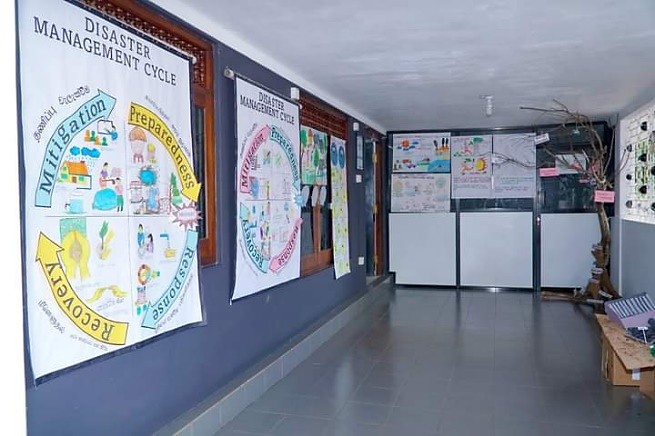
மாற்றத்திற்கான வலுவூட்டல்: இலங்கையில் 3ஜீரோ வீடு / (3Zero House)

3ஜீரோ வீடு (3Zero House) என்பது ACTED Sri Lanka அமைப்பின் கற்றல், புதுமை மற்றும் வலுவூட்டல் ஆகியவற்றிற்கான இலங்கையின் மையமாக செயற்பட்டு, பொருளாதார மற்றும் சமூக மாற்றத்தின் முகவர்களாக இளைஞர்களை வழிநடத்த வேண்டும் என்ற நம்பிக்கையை வலியுறத்துகின்றது. தன்னார்வத் தொண்டு நிறுவனங்கள், அரச அமைப்புக்கள், சமூக அடிப்படையில் அமைந்த நிறுவனங்கள், சிறு மற்றும் நடுத்தர தொழில்முனைவுகள், மற்றும் மிக முக்கியமாக மாற்றங்களை உருவாக்கும் இளையோர்கள் ஆகியோரை ஒன்றிணைப்பதன் மூலம், 3ஜீரோ ஹவுஸ் ஒரு ஒத்துழைப்பு இயக்கத்தை உருவாக்குகிறது. இந்த ஒத்துழைப்பு இயக்கம் பின்வரும் 3 தூண்களால் நிலைப்படுத்தப்பட்டுள்ளது: பூஜ்ஜிய வறுமை, பூஜ்ஜிய விலக்கு, மற்றும் பூஜ்ஜிய கார்பன்.
தற்போது கொழும்பு, வவுனியா மற்றும் மட்டக்களப்பு ஆகிய மாவட்டங்களில் வெவ்வேறு வடிவங்களில் அது தனது முன்மாதிரிக் கட்டத்தில் உள்ளது. 3ஜீரோ ஹவுஸ், சமூக மட்டத்தில் தாக்கத்தை உருவாக்குபவரை நெருங்குவதற்கான கருவிகள் மற்றும் அணுகுமுறைகளை உருவாக்குவதை நோக்கமாகக் கொண்டுள்ளது.
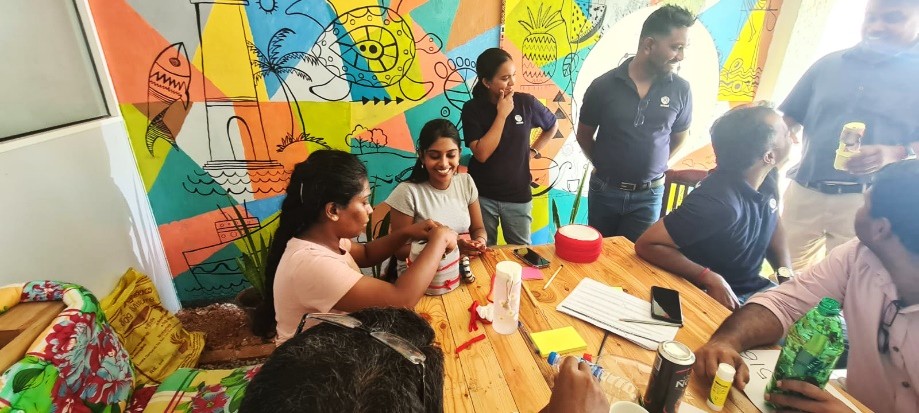
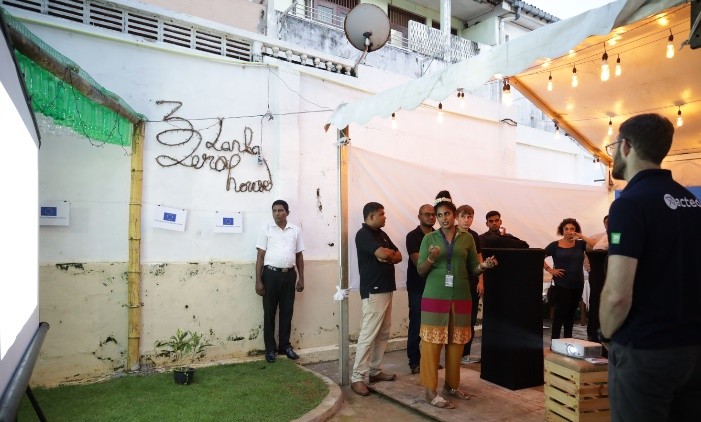
முதலாவது 3ஜீரோ ஹவுஸ் கொழும்பில் அங்குரார்ப்பணம் செய்யப்பட்டது
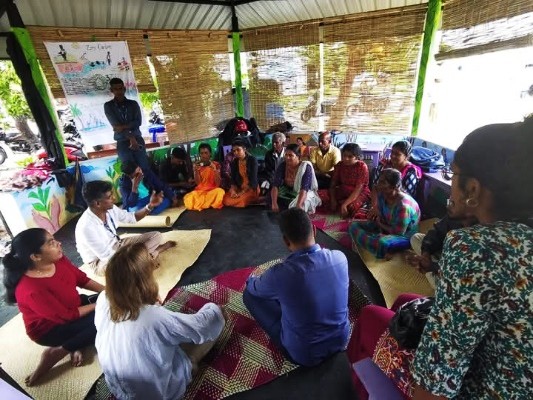
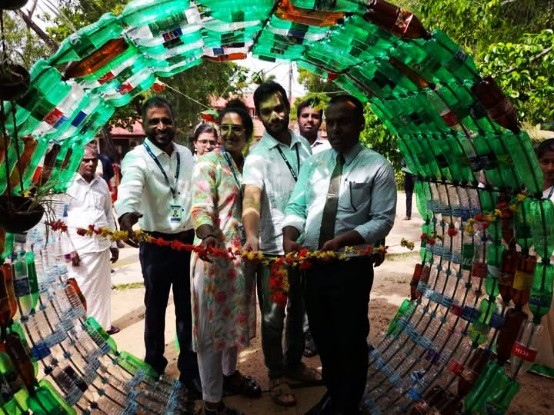
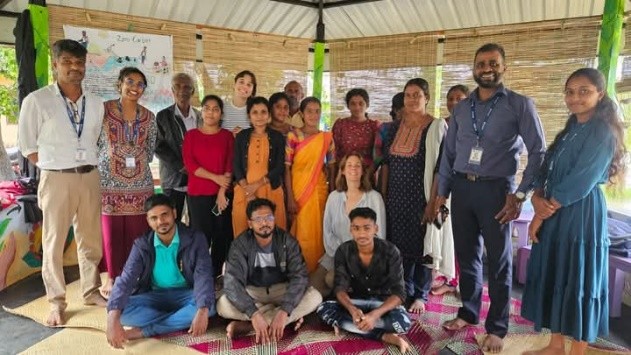
மட்டக்களப்பின் வெல்லாவெளி பிரதேச செயலாளர் அலுவலகத்தில் முதலாவது 3ஜீரோ ஹவுஸ் வளாகம் அங்குரார்ப்பணம் செய்யப்படுகிறது

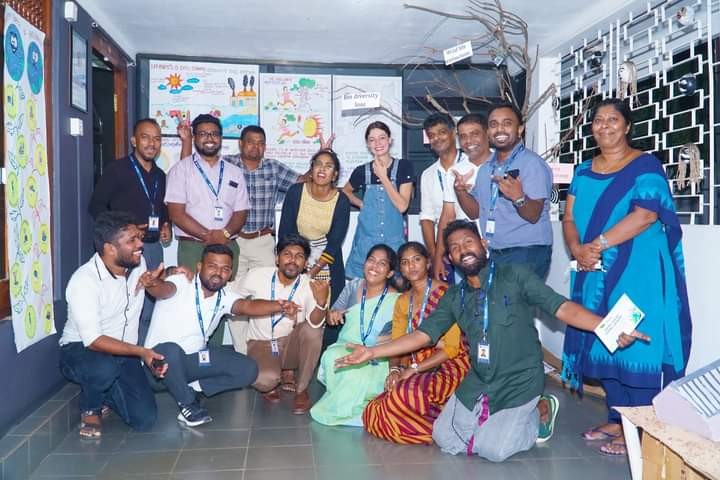
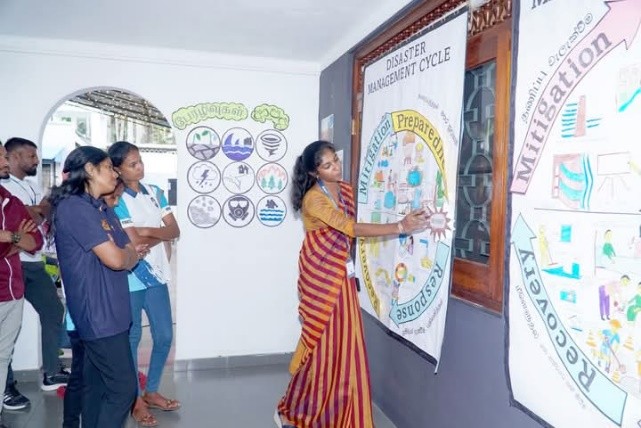
வவுனியாவில் இரண்டாவது 3ஜீரோ ஹவுஸ் அங்குரார்ப்பணம் செய்யப்படுகிறது
ஒரு சுழற்சி பொருளாதாரத்திற்கான தீர்வுகளைத் விருத்தி செய்தல்
பிளாஸ்டிக்ஸ் திட்டத்தின் ஒரு பகுதியாக, பிளாஸ்டிக் பெறுமதிச் சங்கிலியில் உள்ள இடைவெளிகளை நிவர்த்தி செய்ய, 3ஜீரோ ஹவுஸ் மே 2024 இல் புதுமையான தொழில் முனைவுகளுக்கான அழைப்பு விடுக்கப்பட்டது பணிக்கூற்று: மாற்றுப் பொதியிடல், பிளாஸ்டிக் மறு பயன்பாடு மற்றும் 3R (குறைத்தல், மறுபயன்பாடு, மீள் சுழற்சி) அணுகுமுறையை வலுப்படுத்துதல் போன்ற பகுதிகளில் அளவிடக்கூடிய, உள்ளூர் தலைமையிலான தீர்வுகளைக் கண்டறிதல்.
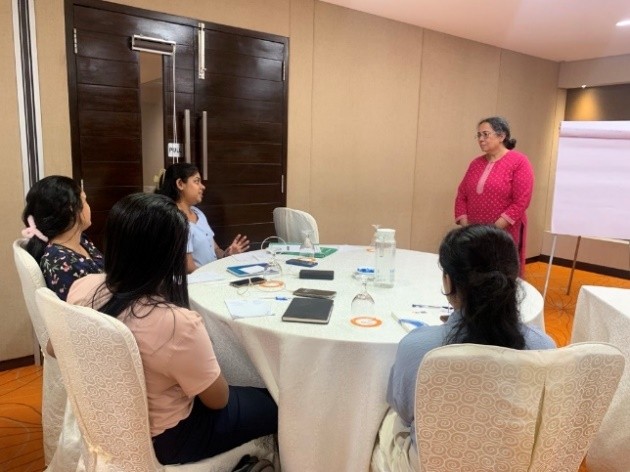
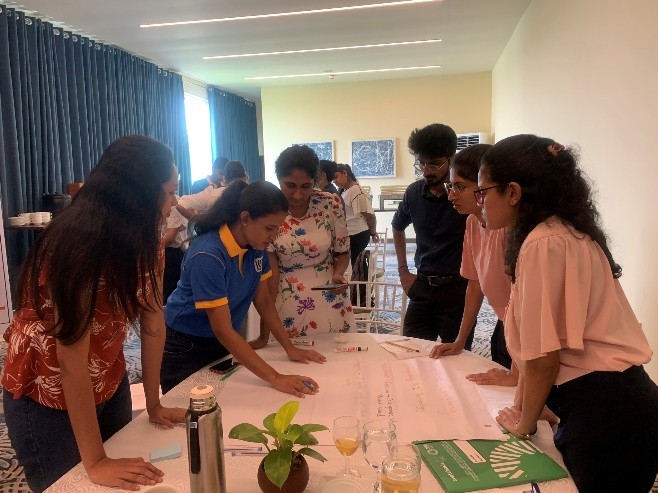
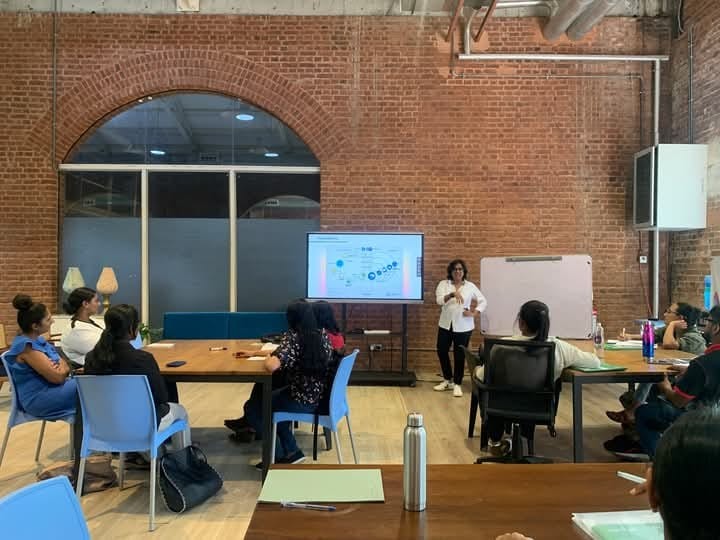
பல்வேறுபட்ட உந்துதலளிக்கும் யோசனைகள் மத்தியில், 8 முன்மாதிரியான வணிகங்கள் 4 மாத கால ஹைபிரிட் இன்கியூபேஷன் திட்டத்திற்கு தேர்ந்தெடுக்கப்பட்டுள்ளன. இது RTI International, AOD Design Academy, NIA, LIIN, GLX, Yarl IT போன்ற சிறந்த சுற்றுச்சூழல் அமைப்பு நிறுவனங்களுடன் இணைந்து வடிவமைக்கப்பட்டுள்ளது. அத்துடன், இது இணைப்பு மற்றும் நிபுணத்துவப் பகிர்வை வளர்க்கிறது. இந்தத் திட்டம், குறித்த வணிகங்களை அவற்றின் குறிப்பிட்ட தேவைகளுக்கு ஏற்றவாறு திறன் மேம்பாடு மற்றும் வடிவமைக்கப்பட்ட பயிற்சி மூலம் மேம்படுத்துகிறது.
குழுவைச் சந்தியுங்கள்
- 💡 இந்த வணிகங்கள் எதுவும் நேரடியாக பிளாஸ்டிக் மதிப்பூட்டல் சங்கிலியில் இல்லை – ஆனால் அவை சவால்களை ஆக்கப்பூர்வமாக சமாளிக்கின்றன!
- 💪 அவற்றில் 6 பெண்கள் தலைமையிலான நிறுவனங்கள்.
- 🧪 மாற்று பொதியிடலின் 2 திட்டங்கள் முன்மாதிரி நிலையில் உள்ளன.
- 👗 3 திட்டங்கள் ஃபேஷன் தொழிற்துறையில் ஒரு பேண்தகுநிலையான எதிர்காலத்தை உருவாக்குகின்றன.
- 🏗 1 திட்டம் கட்டுமான தொழிற்துறையில் உள்ள பொருட்களை மீள்சிந்தனைக்கு உட்படுத்துகிறது.
- 🛋 1 திட்டம் தளபாடங்கள் மற்றும் விநியோகத் தொழிற்துறையில் புதுமைகளை உருவாக்குகிறது.
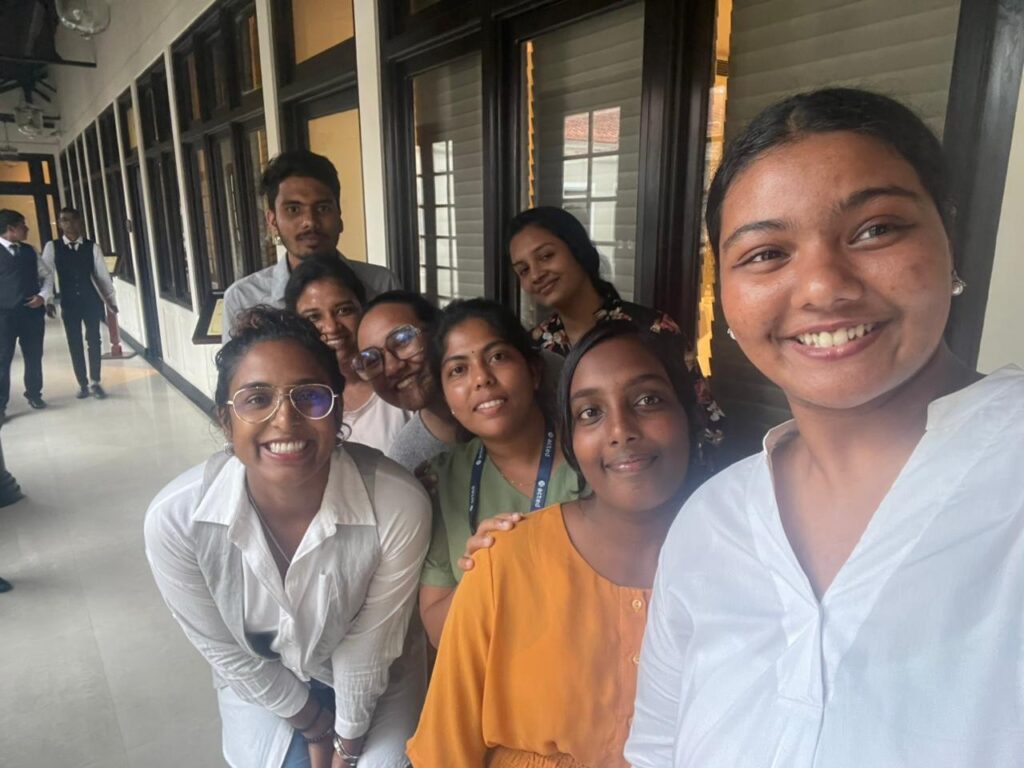
கூட்டாளிகளை சந்திக்கவும்
இளம் தொழில்முனைவோருக்கு தொழில்களை மறுவடிவமைத்து நிலையான மாற்றத்தை உருவாக்கும் சக்தி உள்ளது என்பதை இந்த முன்னெடுப்பு நிரூபிக்கிறது.
- அழகாக வடிவமைக்கப்பட்ட கலை ஆபரணங்கள் மூலம், ஒரு நேரத்தில் ஒரு பொருளை வீணாக்குவதைக் குறைக்கும் நோக்கில் ALKE அமைக்கப்பட்டுள்ளது. இந்த ஸ்டுடியோ, ஒருமுறை மட்டுமே பயன்படுத்தக்கூடிய PET போத்தல்கள், பொலித்தீன் பைகள் மற்றும் சோடா கேன்கள் போன்ற வீட்டுக் கழிவுகளை தொடர் செயன்முறையாக்கத்துக்கு உட்படுத்துகின்றது. இவை, குப்பைக் கிடங்குகளுக்கு அனுப்பப்படுவதற்கு முன்பு இடைமறிக்கப்பட்டு, எங்கள் சமூகங்களிலிருந்து நேரடியாக சேகரிக்கப்படுகின்றன.
- Ample என்பது 18-55 வயதுக்குட்பட்ட பெண்களுக்கான ஆடைகளை வழங்கும் பேண்தகுநிலை கொண்ட ஒரு ஃபேஷன் பிராண்டாகும். நவீன ஃபேஷன் உலகில், மிகவும் மலிவு விலையில் மற்றும் தரமான பொருட்களுக்காக, முறையான, சாதாரண மற்றும் களியாட்ட உடைகளின் பிரிவுகளில் பிரத்தியேகமாக தனித்துவமான வடிவமைப்புகள் உள்ளன. குறிப்பாக பிளஸ் சைஸ் தேவைகளையும் உள்ளடக்கியது.
- காலணி தயாரிப்பின் கழிவுகளை உயர்தர, மற்றும் மலிவு விலையில் செருப்புகளாக மீள்சுழற்சி செய்வதன் மூலம், காலணிகளிலிருந்து வெளிவரும் பிளாஸ்டிக் கழிவுகளைக் குறைப்பதற்கு Solocycle உறுதிபூண்டுள்ளது. இதன் மூலம் வேகமாக மாற்றமடையும் ஃபேஷனால் உருவாகும் பிளாஸ்டிக் மாசுபாட்டை இத்தொழில்முனைவு கையாள்கின்றது.
- Invent of Minds என்பது ஒருமுறை மட்டுமே பயன்படுத்தக்கூடிய பிளாஸ்டிக் பொருட்களுக்கு மாற்றாக மூங்கிலால் செய்யப்பட்ட அலுவலகப் பொருட்களை வழங்குவதில் கவனம் செலுத்தும் ஒரு வணிக நிறுவனமாகும்.
- Star Mushrooms என்பது காளான்களை வளர்ப்பது, கொள்முதல் மற்றும் விநியோகிப்பதில் அர்ப்பணிக்கப்பட்ட முன்னோடி பெண்கள் தலைமையிலான ஒரு குடும்ப வணிகமாகும். தற்போது, காளான்கள் மற்றும் சாண்டஸ்டுகளின் (sandusts) வேர் அமைப்பால் ஆன மைசீலியம் பொதியிடல் குறித்த ஆராய்ச்சியை அவர்கள் மேற்கொண்டு வருகின்றனர்.
- Teshvo தற்போது ஒருமுறை மட்டுமே பயன்படுத்தக்கூடிய பிளாஸ்டிக் மெல்லிய படலத்திற்குப் பதிலாக கடற்பாசி மற்றும் தாவர மாச்சத்தால் ஆன உக்கக்கூடிய மெல்லிய படலத்தை உருவாக்கி வருகிறது.
- Shells Ceylon என்பது சுற்றுச்சூழலுக்கு உகந்த உணவு உண்பதற்கான கருவிகள் மற்றும் வாஃபிள் கூம்புகளை தயாரிக்கும் நிறுவனமாகும். இது உண்ணக்கூடிய பொருட்களைப் பயன்படுத்துவதன் மூலம் ஒருமுறை பயன்படுத்தப்படும் மற்றும் பிளாஸ்டிக்கிலான உணவு உண்பதற்கான கருவிகள், கோப்பைகள் மற்றும் கிண்ணங்களைக் குறைப்பதை நோக்கமாகக் கொண்டுள்ளது.
- AGC Innovate என்பது ‘பிளாஸ்டிக் மாற்றப்பட்ட அஸ்பால்ட் கான்கிரீட் (PMAC)’ ஐ உற்பத்தி செய்யும் ஒரு நிறுவனமாகும். இது மீள்சுழற்சி செய்ய முடியாத கழிவு பிளாஸ்டிக்கை (ஷாப்பிங் பைகள், பிஸ்கட் சுற்றிகள் மற்றும் சாக்லேட் சுற்றிகள் போன்றவை பெரும்பாலும் பொது மற்றும் தனியார் துறைகளால் புறக்கணிக்கப்படுகின்றன) சாலைகள், நெடுஞ்சாலைகள், வாகன தரிப்பிடங்கள் மற்றும் முற்றங்களுக்கு அஸ்பால்ட் ஐ நடைபாதையில் பயன்படுத்த தொழில்துறை மூலப்பொருளாக மாற்றுகிறது.
பிளாஸ்டிக் இல்லாத, நிலைபேறான எதிர்காலத்தை நோக்கி நாம் முன்னேறி வரும் நிலையில், மேலும் புதுப்பிப்புகளுக்கு காத்திருங்கள்!
EU ஐரோப்பிய ஒன்றிய இணையதள கட்டுரை


වෙනස සවිබලගන්වමින්: ශ්රී ලංකාවේ 3Zero නිවස

3Zero නිවස යනු ඇක්ටඩ් ශ්රී ලංකා ආයතනයේ ඉගෙනුම්, නවෝත්පාදනයන් සහ සවිබලගැන්වීම් පිළිබඳව කේන්ද්රය වන අතර ආර්ථිකමය මෙන්ම සාමාජීය පරිවර්තනයන්හි නියෝජිතයන් ලෙස පෙරමං ගතයුත්තේ තරුණයන් බව අපගේ විශ්වාසයයි. රාජ්ය නොවන සංවිධාන, රාජ්ය ආයතන, ප්රජා මූල සංවිධාන, කුඩා හා මධ්ය පරිමාණ ව්යවසායයන් සහ වඩාත් වැදගත් ලෙස වෙනස්කම් ඇතිකිරීමෙහි ලා මූලාරම්භය ගතයුතු තරුණ ප්රජාව යන කණ්ඩායම් ඒකරාශී කිරීම මගින් 3Zero නිවස, දරිද්රතාවය තුරන් කිරීම, වෙනස් කොට සැලකීම් තුරන් කිරීම සහ කාබනික විමෝචනයන් තුරන් කිරීම යන එහි කේන්ද්රීය අංග තුන වටා ගොඩනැගෙන සාමූහික ප්රයත්නයක් සකසමින් හිඳියි.
මෑතකදී කොළඹ, වවුනියාව සහ මඩකළපුව යන දිස්ත්රික්ක තුළ ක්රියාත්මක කරන ලද එහි ප්රාරම්භක අවධියෙහිදී 3Zero නිවස මගින් ප්රජා මට්ටමෙහිදී බලපෑමක් ජනිත කළ හැකි පුද්ගලයන් වෙත සමීප වීම සඳහා විවිධ ප්රවේශයන් මෙන්ම මෙවලම් සංවර්ධනය කිරීම 3Zero නිවස මගින් අරමුණු කෙරේ.


කොළඹ දිස්ත්රික්කය තුළ ප්රථම 3Zero නිවස විවෘත කිරීම



මඩකළපු දිස්ත්රික්කයේ වෙල්ලවවෙලි ප්රාදේශීය ලේකම් කාර්යාලය තුළ ප්රථම 3Zero නිවාස විශ්වවිද්යාලය විවෘත කිරීම



වවුනියා දිස්ත්රික්කය තුළ දෙවන 3Zero නිවස විවෘත කිරීම
චක්රීය ආර්ථිකයක් උදෙසා විසඳුම් පූර්ව නිශ්චය කිරීම
PLASTICS ව්යාපෘතියේ කොටසක් ලෙස, 3Zero නිවස මගින් 2024 මැයි මාසයේදී ප්ලාස්ටික් වටිනාකම් දාමයේ වන පරතරයන් පියවා ගැනීම සඳහා නව්ය ව්යවසායයන් සඳහා කැඳවුමක් දියත් කරන ලදී. මෙහි පර්මාර්ථය වන්නේ විකල්ප ඇසුරුම්කරණය, ප්ලාස්ටික් නැවත භාවිතය සහ 3R (අඩු කිරීම, නැවත භාවිතා කිරීම, ප්රතිචක්රීකරණය) ප්රවේශය ශක්තිමත් කිරීම වැනි ක්ෂේත්රවල පරිමාණය කළ හැකි, දේශීයව මෙහෙයවනු ලබන විසඳුම් සොයා ගැනීමයි.



නිර්මාණශීලී අදහස් ගණනාවක් අතුරින් අදාළ සබඳතාවන් ගොඩනගාගැනීම සහ ඒ ඒ ක්ෂේත්රයන්හි ප්රවීණතාවන් හුවමාරු කරගැනීම ඉලක්ක කරගනිමින් RTI International, AOD Design Academy, NIA, LIIN, GLX, Yarl IT වැනි පාරිසරික පද්ධති (ව්යාපාරික පාරිසරික පද්ධති) තුළ ප්රමුඛ පෙළේ ක්රියාකාරීන්ගේ සහයෝගීතාව ඇතිව සකස් කෙරුනු ව්යාපාරයන්හි විවිධ වූ අංශ ඇතුළත් පූර්ව සැලසුම්කරණ වැඩසටහනක් (සිවු මාසික) සඳහා පුරෝගාමී ව්යාපාර 08 ක් තෝරාගනු ලැබිනි. මෙම වැඩසටහන මඟින් ධාරිතා වර්ධනය සහ මෙම ව්යාපාරයන්හි නිශ්චිත අවශ්යතාවලට ගැලපෙන පරිදි සකස් කරන ලද පුහුණු තුළින් මෙම ව්යාපාර සවිබල ගැන්වීම සිදු කරයි.
සමූහය හමුවෙමු
- 💡 මෙම ව්යාපාරයන් අතුරින් කිසිදු ව්යාපාරයක් සෘජුව ප්ලාස්ටික්ස් අගය දාමයේ වන ව්යාපාරයන් නොවේ – නමුත් ඔවුන් අදාළ අභියෝගයනට නිර්මාණශීලී අයුරින් මුහුණ දෙති !
- 💪 මෙ ව්යාපාරයන් අතුරින් ව්යාපාර 6ක් කාන්තාවන් විසින් මෙහෙයවනු ලබන ඒවා වේ.
- 🧪 විකල්ප ඇසුරුම්කරණ ක්ෂේත්රයෙහි වන ව්යාපෘති අතුරින් 2 ක් ඒවායේ මූලික අවධීන්හි පසුවන ව්යාපෘති වේ.
- 👗 ව්යාපෘති 3 ක් විලාසිතා කර්මාන්තය තුළ තිරසර අනාගතයක් සකසා ගනිමින් හිඳිති
- 🏗 එක් ව්යාපෘතියක් ගොඩනැගිලි කර්මාන්තය සඳහා යොදාගන්නා අමුද්රව්ය පිලිබඳව නවතම දෘෂ්ඨියකින් විමසිමින් සිටියි.
- 🛋 එක් ව්යාපෘතියක් ගෘහ භාණ්ඩ සහ සැපයුම් කර්මාන්ත ක්ෂේත්රය තුළ නව අදහස් අතහදා බලමිනි සිටියි.

ව්යවසායකයින්
මෙම මුල් පියවර මගින් කර්මාන්ත නැවත හැඩගැස්වීම සහ ඒ තුළ තිරසාර වෙනසක් ඇති කිරීම සඳහා අවශ්ය සවිය තරුණ ව්යවසායකයින් සතු බව සනාථ වේ.
- ALKE යනු වරකට එක් කසළ අයිතමය බැගින් බැහැර කිරීමේ මෙහෙයුම මත පිහිටා සිටිමින් ඒවායින් අලංකාරවත් මෙන්ම නිර්මාණශීලී කළාත්මක ආභරණ නිර්මාණයෙහි නියැලී සිටින ආයතනයකි. ඉඩම් ගොඩකිරීම වෙනුවෙන් නියම වීමට පෙර අපගේ ප්රජාවන් වෙතින් සෘජුවම එක්රැස් කරගනු ලබන වරක් භාවිතා කොට ඉවතදමන PET බෝතල්, පොලිතීන් බෑග්, සෝඩා කෑන් වැනි ගෘහස්ථ කසළ මෙම ස්ටූඩියෝව තුළ සැකසීමට ලක් කෙරෙනු ලැබේ.
- Ample යනු වයස අවු. 18 – 55 ත් අතර වයස් සීමාවන්හි වන කාන්තාවන්ගේ ඇඟළුම් සඳහා වෙන්වුනු තිරසර විලාසිතා සන්නාමයකි. වත්මන් විලාසිතා ලෝකය තුළ නව ප්රවණතාවන් අන්තර්ගතව සැකසුන කාර්යාලීය විලාසිතාවන්,සරළ කාර්යාලීය විලාසිතාවන් මෙන්ම උත්සව අවස්ථා වෙනුවෙන් සැකසුනු විලාසිතාවන්ගෙන් සමන්විත ග්රණාත්මක අමුද්රව්ය යොදාගෙන සකසන ලද ඔවුනටම අනන්ය වූ විලාසිතාවන් රැසක් දැරිය හැකි මිල ගණන් වලට ඔවුන් වෙතින් ලබාගැනීමේ හැකියාව පවතී. මෙහි විශේෂත්වය වන්නේ විශාලත්වයෙන් වැඩි ඇඟළුම් අවශ්යතා පිලිබඳවද ඔවුන් විශේෂ අවධානයක් යොමු කර තිබීමයි.
- Solocycle ආයතනය ඉක්මනින් වෙනස් වන විලාසිතාකරණයන් මගින් ජනනය වන ප්ලාස්ටික් දූෂණය ට පිලියමක් ලෙස, භාවිතයේන බැහැර කෙරෙන ප්ලාස්ටික් සපත්තු අඩි ප්රතිචක්රීකරණය කොට එමගින් දැරිය හැකි මුදලකට මිලදී ගතහැකි ඉහළ ගුණාත්මක භාවයකින් යුත් පාවහන් නිහ්පාදනයෙහි නියැලී සිටිති.
- Invent of Minds යනු වරක් භාවිතා කොට ඉවත දමනු ලබන ප්ලාස්ටික් අයිතම වෙනුවට විකල්පයක් ලෙස උණ ලී භාවිතා කරමින් කාර්යාලීය අයිතම නිශ්පාදනය කොට වෙළඳපොළට නිකුත් කිරීමේ අදහස කේන්ද්ර කරගනිමින් ඒ වටා ගොඩනැගුණු ව්යාපාරයකි.
- Star Mushrooms ව්යාපාරය බිම්මල් වගාව, සැපයුම සහ බෙදාහැරීමෙහි ලා පුරෝගාමීව කටයුතු කරන කාන්තාවන් විසින් මෙහෙයවනු ලබන පවුලේ ව්යාපාරයකි. වත්මන වනවිට ඔවුන් මයිසීලියම් ඇසුරුම්කරණය ( mycelium packaging – බිම්මල් වල මුල් පද්ධතිය සහ දැවකුඩු යොදාගෙන නිපදවනු ලබන මෙම අමුද්රව්යය ප්ලාස්ටික් සදහා ගුනාත්මක ආදේශකයක් ලෙස ලොව පුරා ව්යාප්ත වෙමින් පවතී) ) පිලිබඳ තම පර්යේෂණයන් පුළුල්ව සිදුකරගෙන යමින් සිටිති
- Teshvo ආයතනය මේ වනවිට, වරක් භාවිතා කොට ඉවත ලන තුනී ප්ලාස්ටික් ආවරණ වෙනුවට ආදේශකයක් ලෙස භාවිතා කළහැකි ඝණකමින් අඩු ජෛවහායනීය ආවරණයක් ගොඩනගමින් හිඳිති
- Shells Ceylon යනු වරක් භාවිතා කොට ඉවත දමනු ලබන ප්ලාස්ටික් හැඳි, ගෑරුප්පු, කෝප්ප සහ බඳුන් භාවිතය අවම කොට ඒ වෙනුවට ආහාරයට ගත හැකි හැඳි, ගෑරුප්පු සහ වොෆල් කෝන් නිශ්පාදනය කිරීමට ඉලක්ක කරන පරිසර හිතකාමී සමාගමකි
- AGC Innovate සමාගම ප්රතිචක්රීකරණය කල නොහැකි, ෂොපින් බෑග්, බිස්කට් දවටන සහ චොකලට් දවටන වැනි, නිරන්තරවම පෞද්ගලික මෙන්ම රාජ්ය අංශයන් විසින්ද නොසලකා හරිනු ලබන,බැහැර කරන ප්ලාස්ටික් අපද්රව්ය යොදාගනිමින් “Plastic Modified Asphalt Concrete (PMAC),” යන මාර්ග, අධිවේගී මාර්ග, රථගාල් සහ අංගන සඳහා යොදාගන්නා තාර ඇතිරීම් නිශ්පාදනය සිදු කරන ආයතනයකි
ප්ලාස්ටික් වලින් තොර තිරසර අනාගතයක් කරා පියමං කරන අප ගමන පිළිබඳව නවතම තොරතුරු දැනගැනීම පිනිස අප සමගින් රැඳී සිටින්න!


ஒரு பசுமையான எதிர்காலத்துக்காக SME களை வலுப்படுத்தல்: PLASTICS திட்டத்தின் கீழ் வியாபாரத் திட்டம் உருவாக்கல் பயிற்சி


இலங்கையின் பொருளாதாரத்தை ஒரு சுழற்சிப் பொருளாதாரமாக நிலைமாற்றுவதில் சிறிய மற்றும் நடுத்தர தொழில்முனைவுகள் (SMEs) ஒரு முக்கிய வகிபாகத்தைக் கொண்டுள்ளன. இதனைக் கருத்திற்கொண்டு, ஐரோப்பிய ஒன்றியத்தின் (EU) நிதியுதவியில் முன்னெடுக்கப்படும் PLASTICS திட்டம், பிளாஸ்டிக் மீள்சுழற்சி பெறுமதிச் சங்கிலியில் உள்ள 152 SME களுக்கு பேண்தகுநிலை மற்றும் இலாபமீட்டும் திறன் என்பவற்றை அடையத் தேவையான முக்கிய திறன்களை வழங்குகின்றது.
தொழிற்துறை சேவைகள் பணிமனையின் (ISB) ஒத்துழைப்புடன் இலங்கையின் மேல் மாகாணத்தில் வியாபாரத் திட்டம் தயார்படுத்தலுக்கான 5 நாள் முழுமையான பயிற்சி வெற்றிகரமாக நடத்தி முடிக்கப்பட்டது. இந்த அமர்வுகள் கம்பஹா, கொழும்பு, மற்றும் களுத்துறை மாவட்டங்களில் நடத்தப்பட்டது. இப்பயிற்சித் தொடர் மூலமாக 113 விபரமான வியாபாரத் திட்டங்கள் தயாரிக்கப்பட்டுள்ளதுடன், மேலும் எட்டுத் திட்டங்கள் தயாரிப்பில் உள்ளன. மேலும் 15-20 SME களை இலக்கு வைத்து 2024 டிசம்பர் மாதம் இன்னொரு மேலதிக பயிற்சி அமர்வு நடத்தப்படவுள்ளது.
வெற்றிக்கான ஒரு அடித்தளத்தை உருவாக்குதல்
இந்தப் பயிற்சி அமர்வுகள் வியாபாரத் திட்டமிடலின் அடிப்படை கருதுகோள்களுக்கு மேலதிகமாக, நீண்ட கால மூலோபாயங்களுடன் பேண்தகுநிலை மற்றும் புத்தாக்கம் என்பவற்றின் கொள்கைகளை இணைப்பதிலும் கவனம் செலுத்தப்பட்டது. வியாபாரத் திட்டங்களில் பின்வருவன உள்வாங்கபடுகின்றன:
- தொலைநோக்கு (Mission), பணிப்பாதை (Vision), மற்றும் நிறுவன வளர்ச்சிக்கான குறிக்கோள்கள்.
- செயல்பாட்டை ஒருமுகப்படுத்துவதற்கான சந்தைப்படுத்தல், உற்பத்தி மற்றும் மனித வளத் திட்டங்கள்.
- தகவலறிந்த தீர்மானம் மேற்கொள்ளலுக்காக நிதியியல் எதிர்வுகூறல் மற்றும் விகிதப் பகுப்பாய்வு.
பங்கேற்பாளர்களின் வியாபாரங்களை சுழற்சி பொருளாதாரத்துடன் ஒன்றிணைக்கும் வகையில் வள வினைத்திறன், தூய்மையான உற்பத்தி, பசுமை முதலீடுகள், சமூக மற்றும் பால்நிலை உள்வாங்கல் போன்ற முக்கிய கூறுகளை உள்ளடக்க பங்கேற்பாளர்கள் பயிற்றப்பட்டனர்.
திட்டங்களை முன்னேற்றமாக மாற்றியமைத்தல்
இந்தப் பயிற்சியின் நிகழ்ச்சித்திட்டத்தின் தாக்கம் பல SME களுக்கு நிலைமாற்றத்தை ஏற்படுத்துவதாக அமைந்திருந்தது:
- கட்டமைப்பு மேம்பாடுகள்: இயக்கத்தை செம்மையாக்கவும் உற்பத்தித் திறனை ஊக்குவிக்கவும் பங்கேற்பாளர்கள் நடைமுறை அறிவைப் பெற்றுக்கொண்டனர்:
- சிறந்த நிதியியல் உள்நோக்குகள்: இலாப நட்ட பகுப்பாய்வுகளை தற்போது SME கள் புரிந்துகொள்கின்றன, அதன் மூலமாக அவற்றால் புத்திசாதுரியமான முதலீடுகளை மேற்கொள்வது இயலுமாகியுள்ளது.
- நிதியிடலுக்கான அணுகல்: வாண்மைத்துவமாக உருவாக்கப்பட்ட தமது வியாபாரத் திட்டங்களை அளிக்கை செய்ததன் மூலமாக, பல வியாபாரங்களால் ஏற்கனவே வங்கிக் கடன்களைப் பெற முடிந்துள்ளது.
பின்வருவன உள்ளடங்கலாக PLASTICS திட்டத்தினால் வழங்கப்படும் ஏனைய வாய்ப்புகளை SME கள் அணுகுவதற்கான வழியையும் இவ்வியாபாரத் திட்டங்கள் வழங்குகின்றன:
- பசுமை நிதியிடல் மற்றும் RECP (வள வினைத்திறன் மற்றும் தூய உற்பத்தி) மதிப்பீடுகள்:
- QEMS (துரித சூழல் முகாமைத்துவ முறைமை) சான்றழிப்பு மற்றும் ISO 14001 இணக்கப்பாடு.
- விற்பனையாளர் – கொள்வனவாளர் மன்றங்களில் பங்கேற்றல், பெறுமதியான சந்தைத் தொடர்புகளை வளர்த்தல்.
ஒரு ஒத்துழைப்பான முயற்சி
இந்த பயிற்சி அமர்வுகளின் வெற்றி ISB, ACTED, மற்றும் PLASTICS திட்டம் என்பவற்றின் ஒத்துழைப்பு அணுகுமுறைக்கு சான்று பகர்வதாக உள்ளது. அனுபவம் மிக்க பயிற்றுனர்கள் மற்றும் வியாபார விருத்தி நிபுணர்களின் தலைமையில் இந்த அமர்வுகளை நடத்தியதுடன் ACTED பணியாளர்கள் உரிய ஆதரவுகளை வழங்கியதுடன் சிறந்த ஒழுங்கமைப்பு மற்றும் ஏற்பாட்டியல் நடவடிக்கைகளை மேற்கொண்டனர்.
பேண்தகுநிலையை நோக்கிய ஒரு வழி
பல SME களுக்கு இந்த முன்னெடுப்பு ஒரு திருப்புமுனையாக அமைந்திருந்தது. பேண்தகு நடைமுறைகளைக் கைக்கொள்ளல், செயற்பாடுகளை மேம்படுத்தல், மற்றும் ஒரு போட்டித்தன்மை மிக்க சந்தையில் செழிப்படைதல் போன்றவற்றுக்கு அவர்களை வலுப்படுத்தியது. தமது மூலோபாயங்களுடன் சுழற்சிப் பொருளாதாரக் கொள்கைகளை இணைப்பதன் மூலம், இந்த வியாபாரங்கள் சூழல் தாக்கத்தைக் குறைப்பது மாத்திரமன்றி தமது தாங்குதிறன் மற்றும் இலாபமீட்டும் திறனையும் வலுப்படுத்தியுள்ளனர்.
பேண்தகுநிலை மிக்க SME துறையின் விருத்தியில் அர்ப்பணிப்பு உள்ளதாக PLASTICS திட்டம் அமைந்துள்ளது, ஒரு நேரத்தில் ஒரு வியாபாரத்திட்டம் என இது முன்னோக்கி நகர்கின்றது.

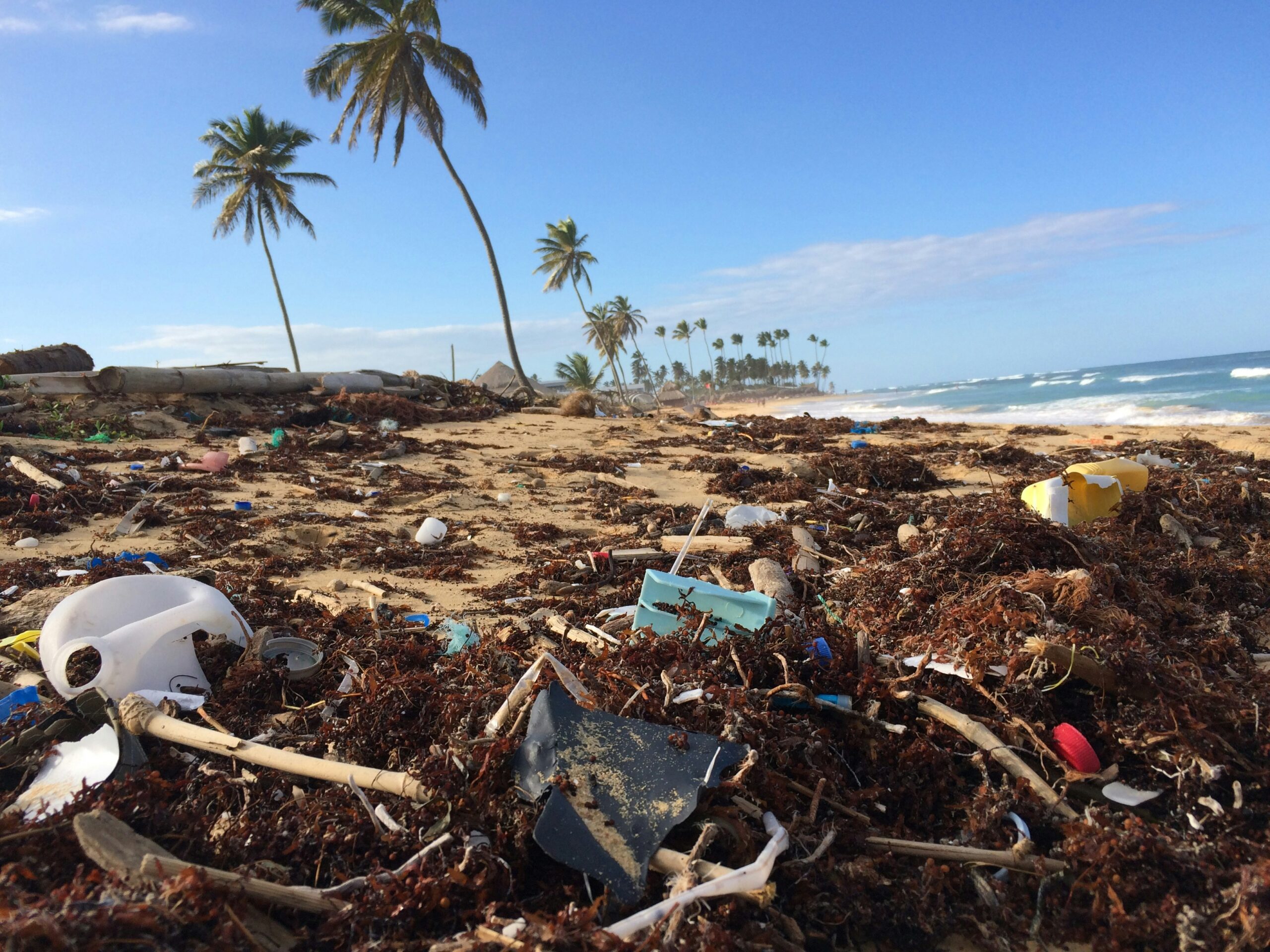
හරිතමය අනාගතයකට මං තනමින් : ශ්රී ලංකාව තුළ ක්රියාත්මක ප්ලාස්ටික්ස් ව්යාපෘතිය

ප්ලාස්ටික්ස් : ශ්රී ලංකාව තුළ තිරසර, පරිවර්තනීය මෙන්ම අන්තර්කරණීය වූ චක්රීය ආර්ථිකයක් ගොඩනැංවීම උදෙසා දීර්ඝ කාලීන ප්රවේශයන් දිරිගැන්වීම
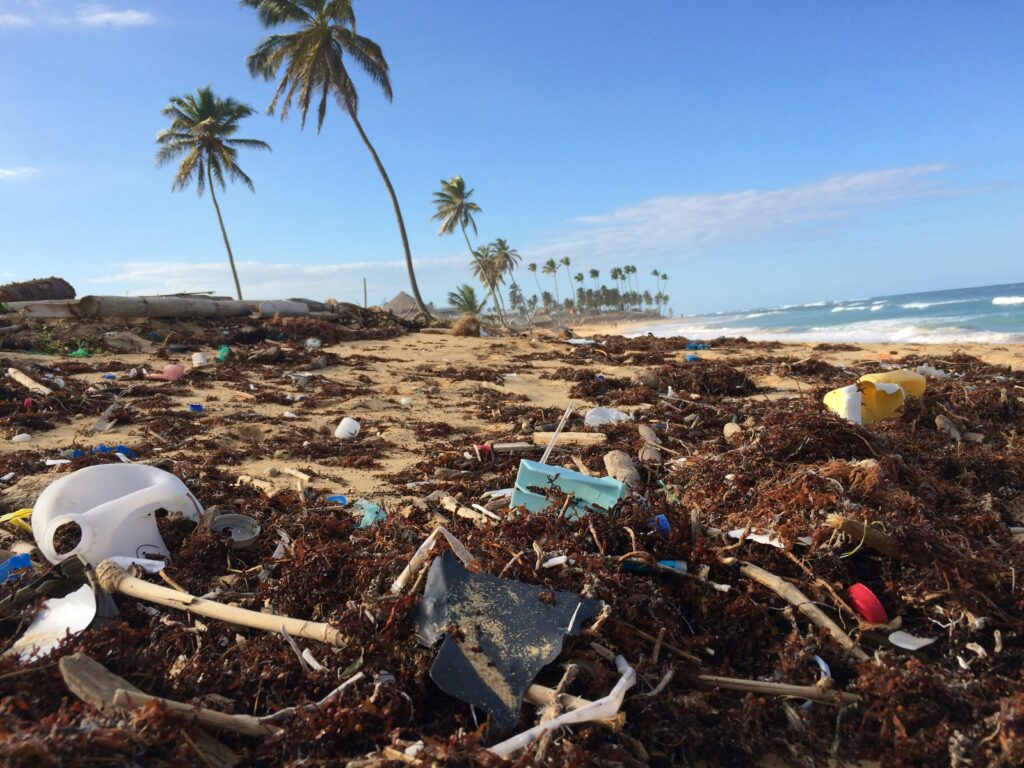
ශ්රී ලංකාවට වාර්ෂිකව ප්ලාස්ටික් ටොන් 500,000 අධික ප්රමාණයක් ආනයනය කෙරෙන අතර දළ වශයෙන් සමස්තයක් ලෙස ප්ලාස්ටික් අපද්රව්ය ටොන් මිලියන 1.56 ක ප්රමාණයක් වැරදි අයුරින් කළමණාකරණය කෙරෙන බව සොයාගෙන තිබේ. ශ්රී ලංකාවේ ප්ලාස්ටික් අගය සහ සැපයුම් දාමයෙහි වන ලබාගැනීම නිපැදවීම – බැහැර කිරීම යන රේඛීය ආකෘතිය වඩාත් චක්රීය ප්රවේශයක් ඔස්සේ ලබාගතහැකි ආර්ථිකමය ප්රතිලාභයන් ලඟාකරගැනීමට අසමත් ආකෘතියක් වේ.
යුරෝපා සංගමය මගින් ප්රතිපාදන සපයනු ලබන ප්ලාස්ටික්ස් ව්යාපෘතිය මගින් බස්නාහිර පළාත තුළ වන කුඩා හා මධ්ය පරිමාණ ව්යවසායයන්හි (SMEs) සම්පත් කාර්යක්ෂම ලෙස භාවිතය, චක්රීය නවෝත්පාදනයන්, හරිත මූල්යය සහ තිරසර කසළ කළමණාකරණය (SWM) යන ක්රමවේදයන් ඔස්සේ ප්ලාස්ටික් අගය හා සැපයුම් දාමය තුළ ආර්ථික සංවර්ධනයක් ඇති කිරීම ඉලක්ක කරයි.
කුඩා හා මධ්ය පරිමාණ වයවසායයන් 150 කට, ව්යවසායකයන් 10 දෙනෙකු හට, ව්යාපාර සංවර්ධන සේවා සපයන්නන් 50 කට, මූල්ය සහ රාජ්ය ආයතන 10 කට සහ පෞද්ගලික අංශයේ ක්රියාකාරීන් රැසකට හරිත ව්යාපාරයන් සංවර්ධනයෙහි ලා හිතකර වටපිටාවන් ප්රවර්ධනය සඳහා සහාය ලබා දෙනු ඇත, ව්යාපාරයනට, විශේෂයෙන්ම කාන්තාවන් විසින් මෙහෙයවනු ලබන ව්යාපාරයනට ඒවායේ සමස්ත තරඟකාරීත්වය සහ පිරිවැය කාර්යක්ෂමතාව වැඩිදියුණු කිරීම ඔස්සේ තම අගය එකතු කිරීම් ඉහල නංවා ගැනීමට සහාය සැපයෙනු ඇත.
පරමාර්ථය
මෙම ව්යාපෘතියේ පරමාර්ථය හරිතමය අගය සහ සැපයුම් දාමයන් තුළට කුඩා හා මධ්ය පරිමාණ ව්යවසායයන් අන්තර්ගත කරවාගැනීම මගින් ශ්රී ලංකාව තුළ තිරසර මෙන්ම නවීන වූ ප්ලාස්ටික් භාවිතය අවම කිරීමේ ක්රමවේදයන් සහ කළමණාකරණයන් ක්රියාත්මක කිරීම ඔස්සේ රටෙහි ආර්ථික සංවර්ධනයට සහ පාරිසරික තිරසරභාවයට දායක වීමයි.
අපේක්ෂිත ප්රතිඵල
- ප්ලාස්ටික් අගය සහ සැපයුම් දාමයන්හි වන කුඩා හා මධ්ය පරිමාණ ව්යවසායයන් විසින් චක්රීය ආර්ථික ක්රමෝපායයන් අනුගමනය කරති.
- ප්ලාස්ටික් අගය සහ සැපයුම් දාමයන් පුරාවට නව මෙන්ම චක්රීය වූ ආර්ථික ප්රවේශයන් ප්රචලිත කරවනු ලැබේ.
- විශේෂයෙන්ම ක්රඩා හා මධ්ය පරිමාණ ව්යවසායයන් අතර හරිත ආර්ථික මූලාරම්භයන් ඉහළ නැංවීම සඳහා මූල්යය වෙත සහ හරිත ආයෝජනයන් වෙත වන ප්රවේශයන් ඉහළ දමනු ලැබේ..
- රාජ්ය හා පෞද්ගලික අංශ අතර සංවාදයන්, සහයෝගීතාවන් සහ අධීක්ෂණයන් ඔස්සේ තිරසර ප්ලාස්ටික් අපද්රව්ය කළමණාකරණය පිළිබඳව වන එකඟතාවන්, විනිවිදභාවයන් සහ ඒ පිළිබඳ සොයාබැලීමේ හැකියාව සවිමත් කෙරේ.





